
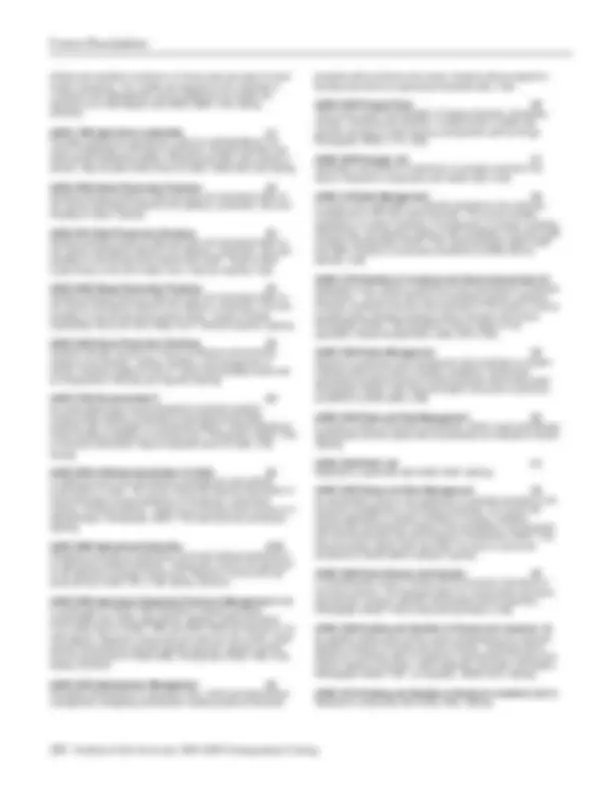
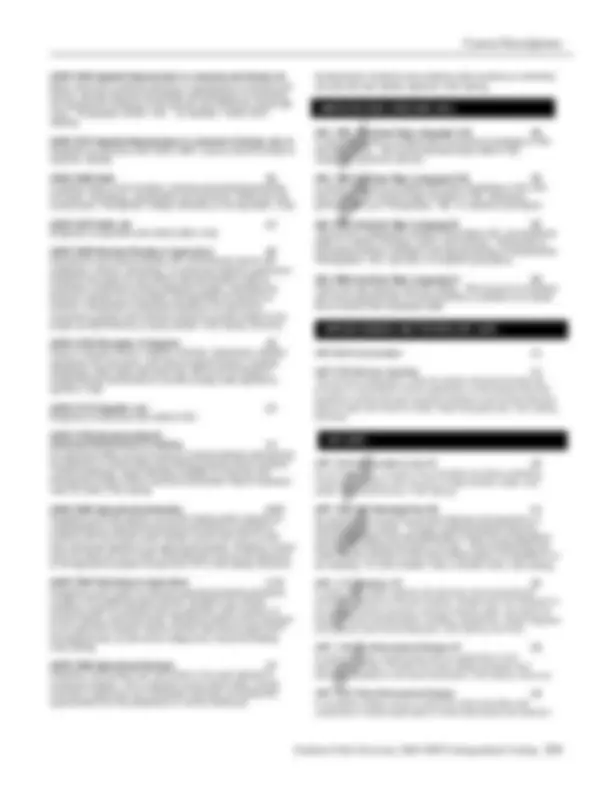
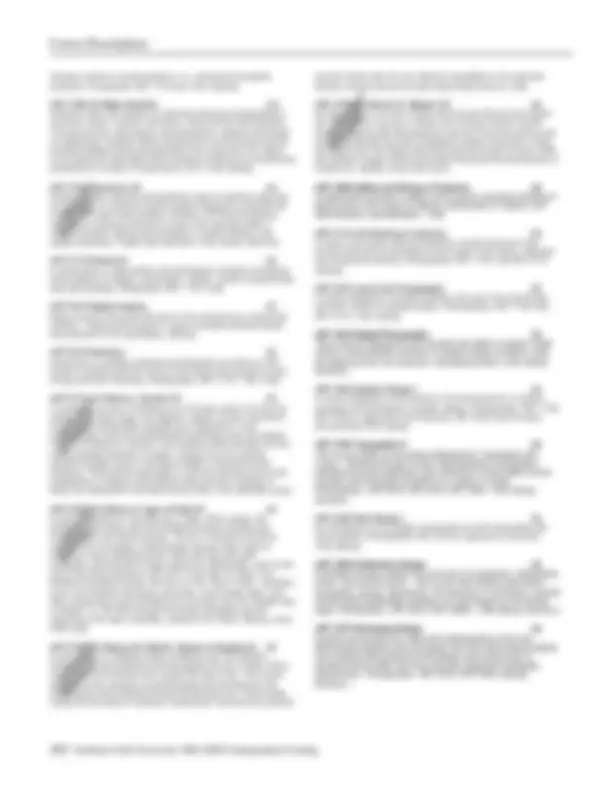
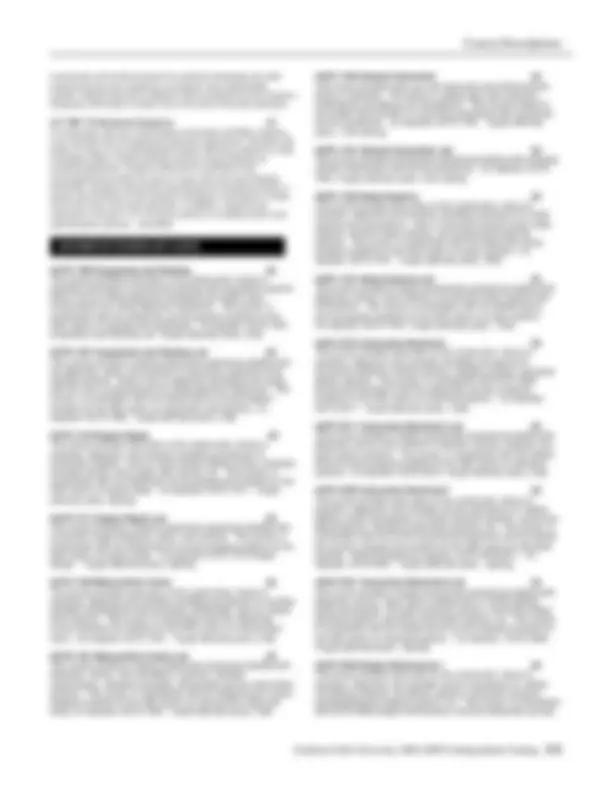
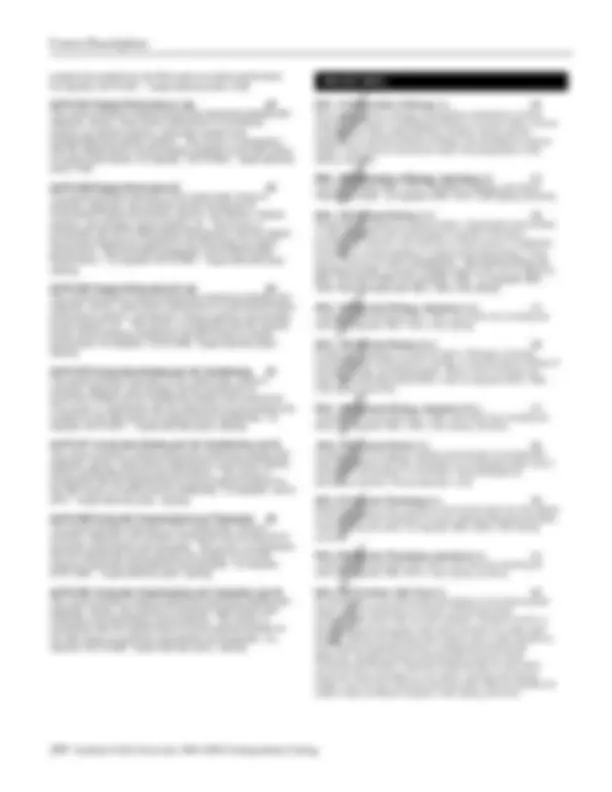
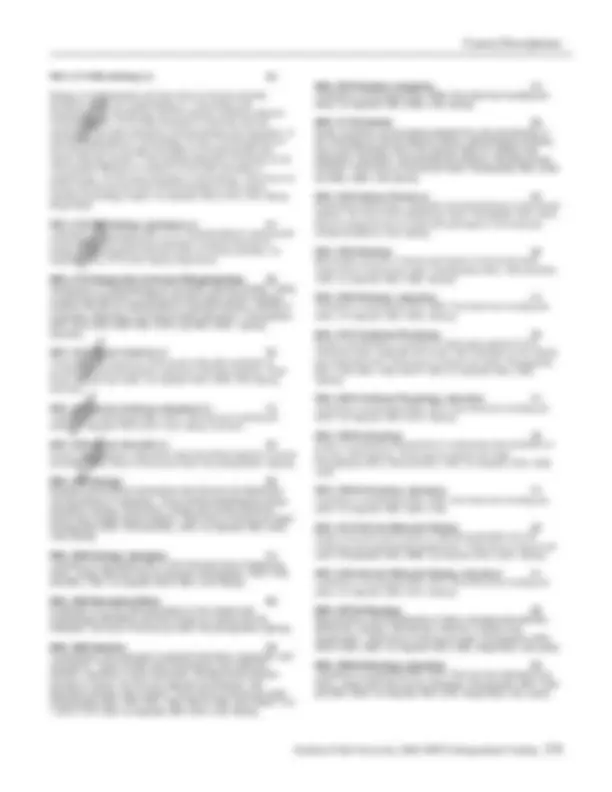
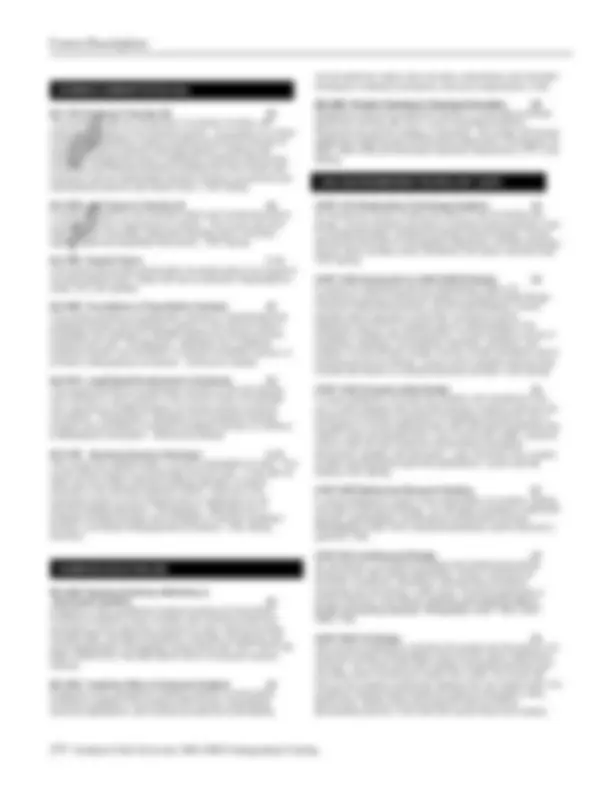
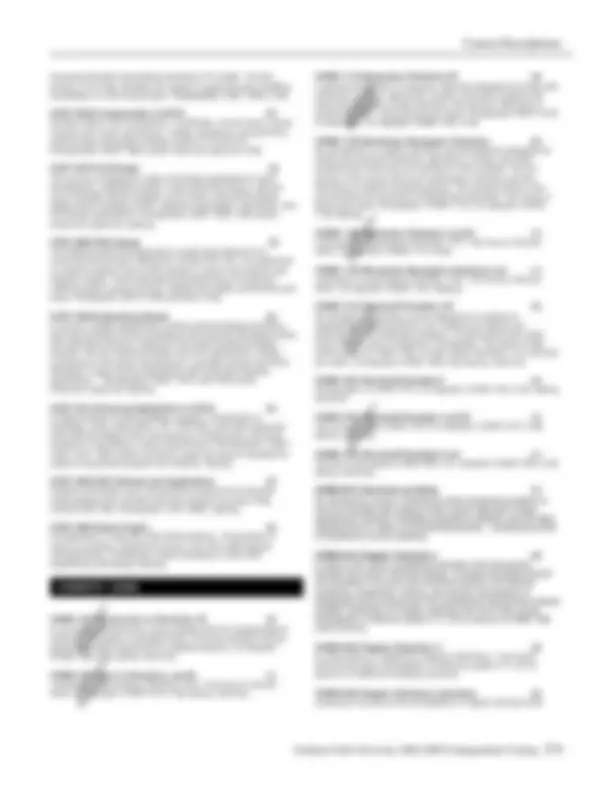
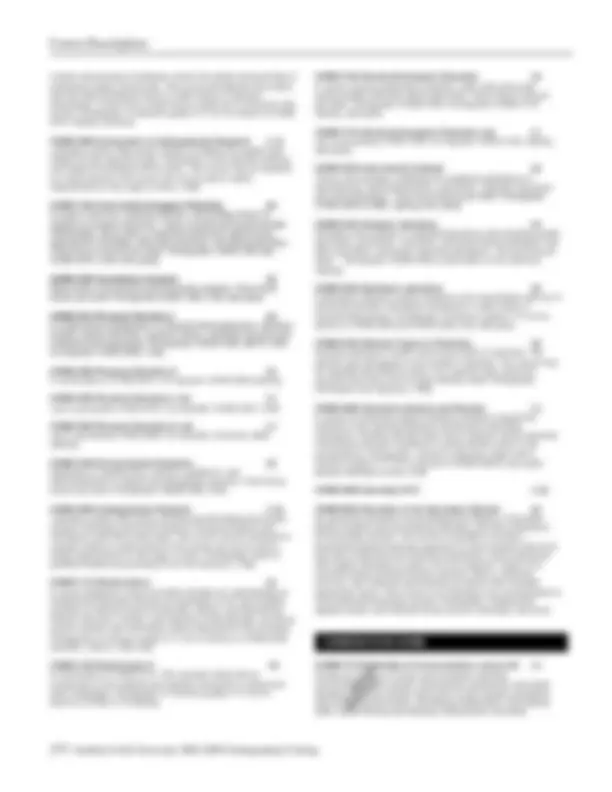
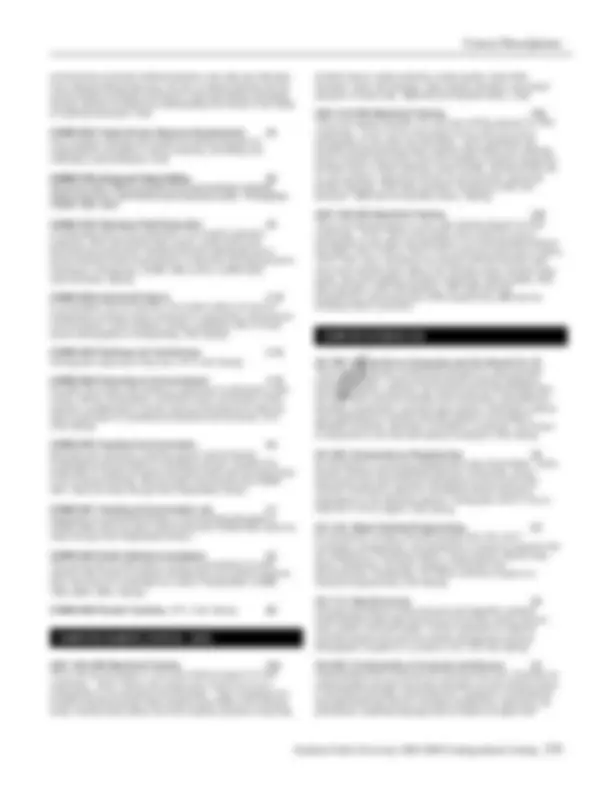
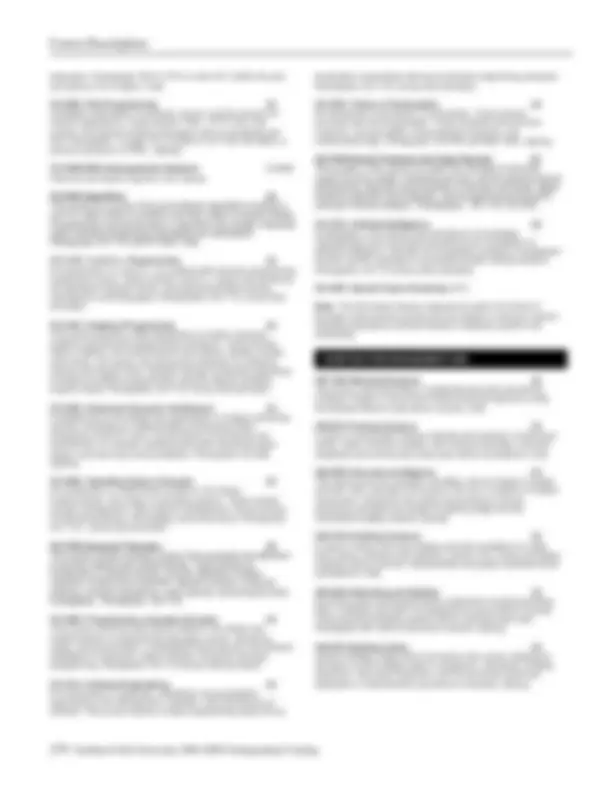
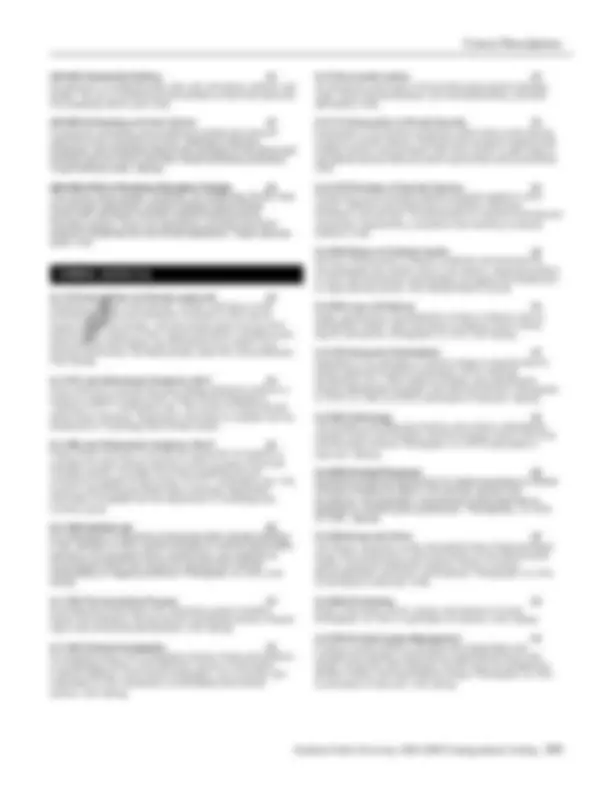
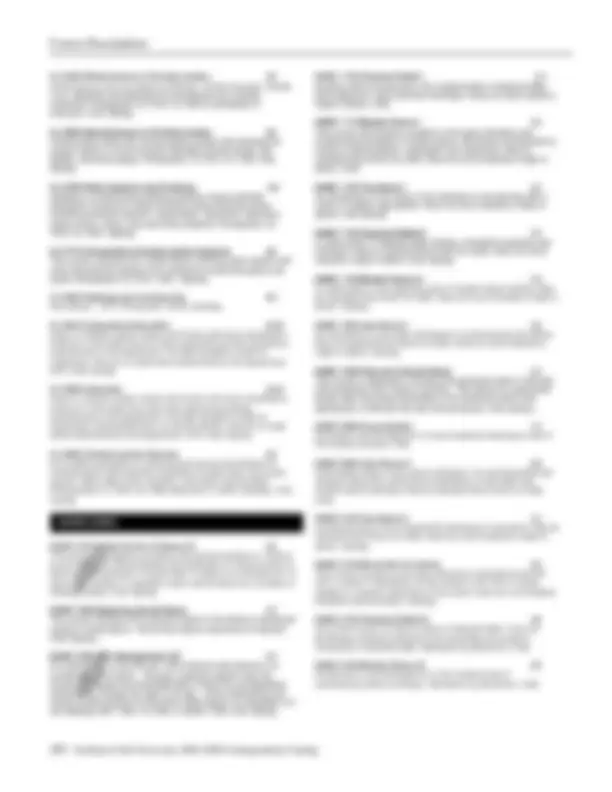
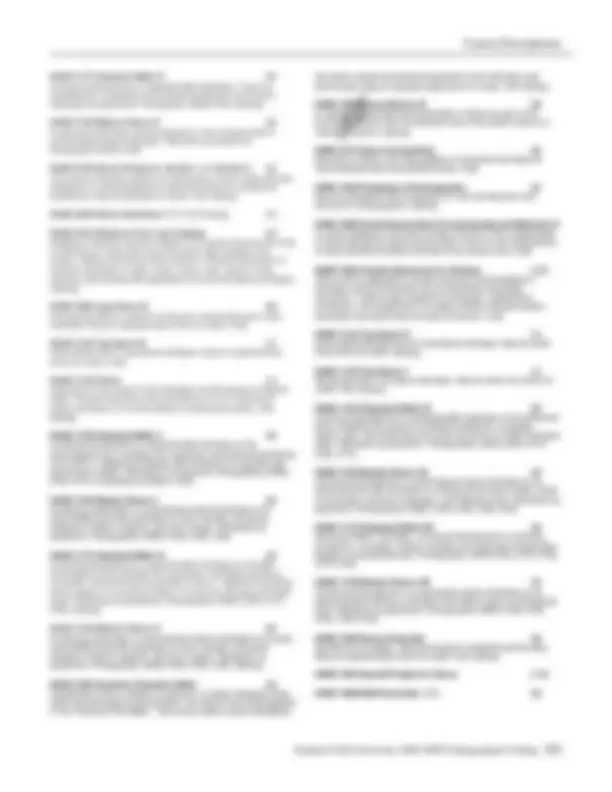
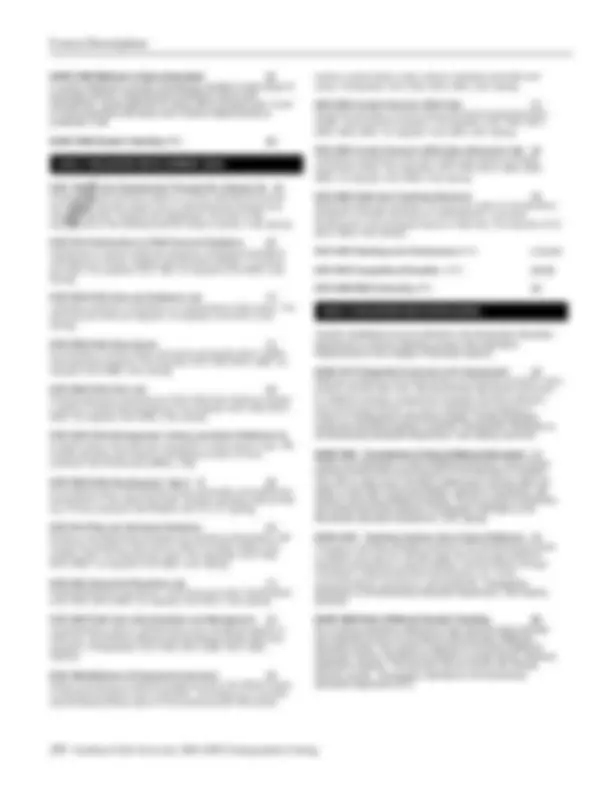
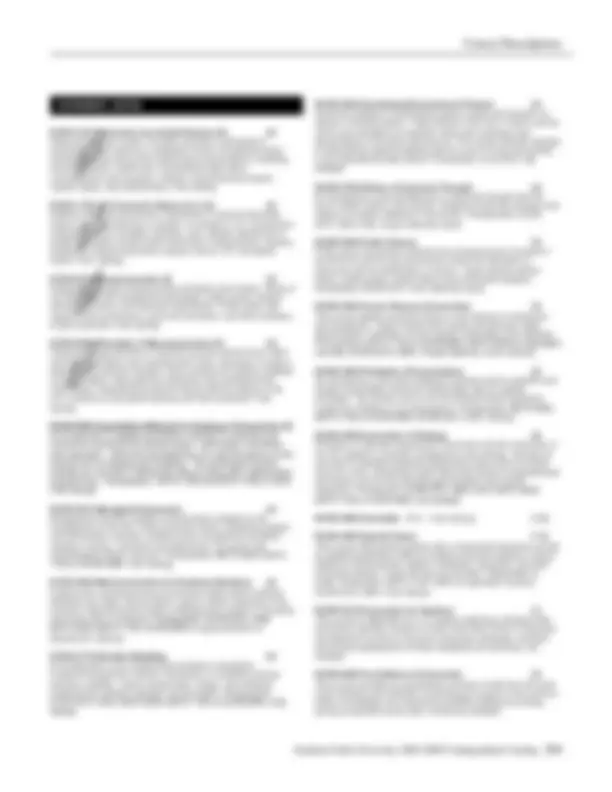
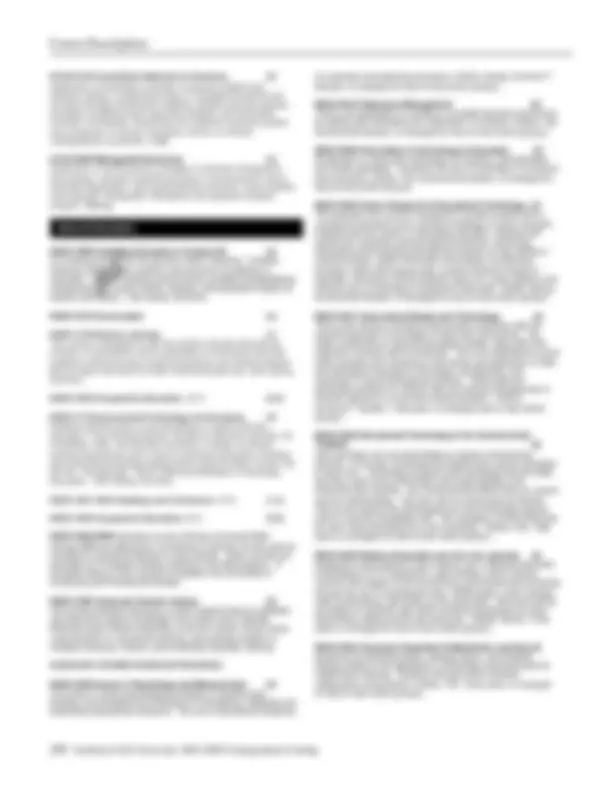
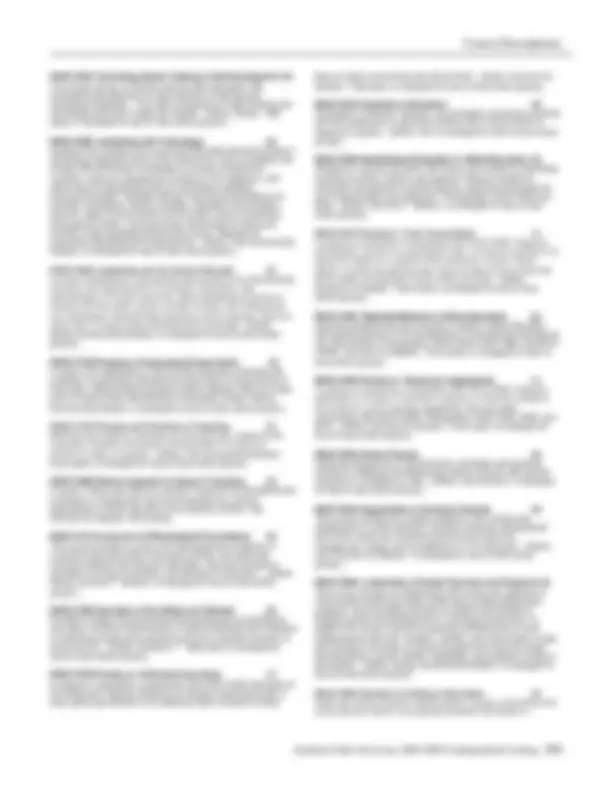
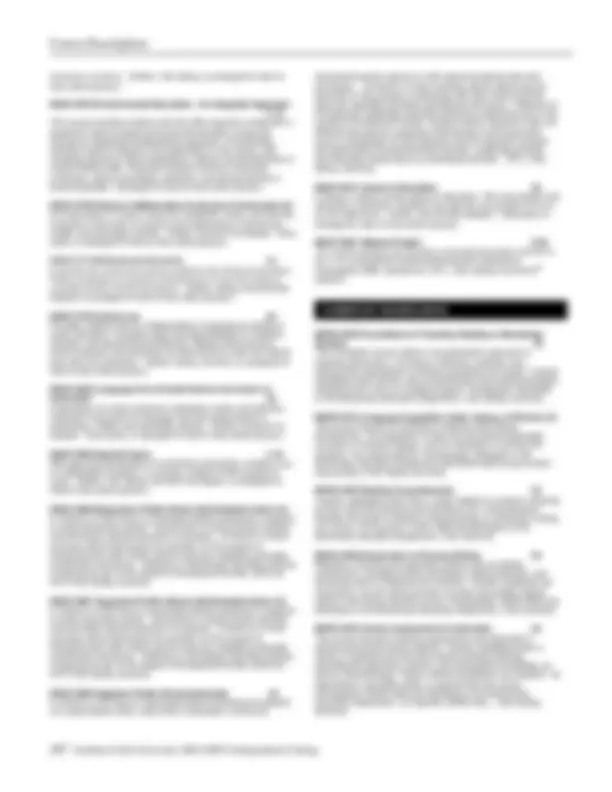
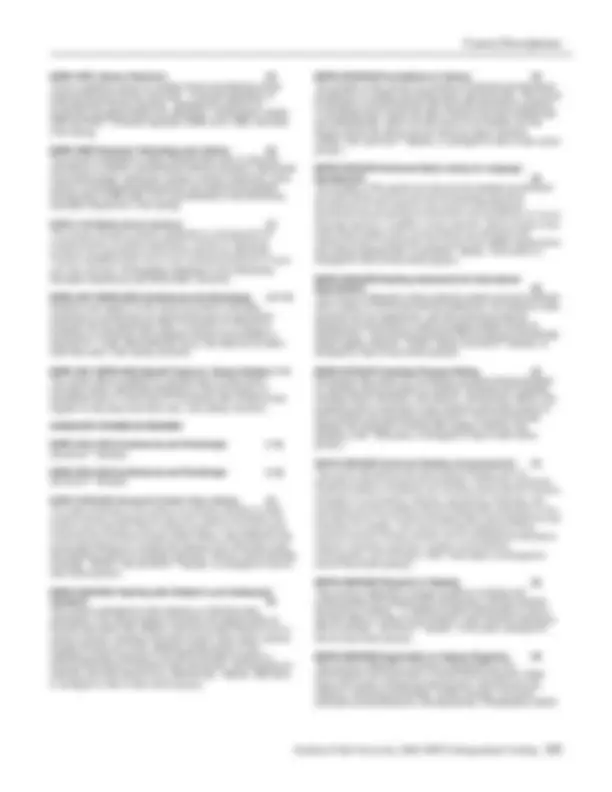
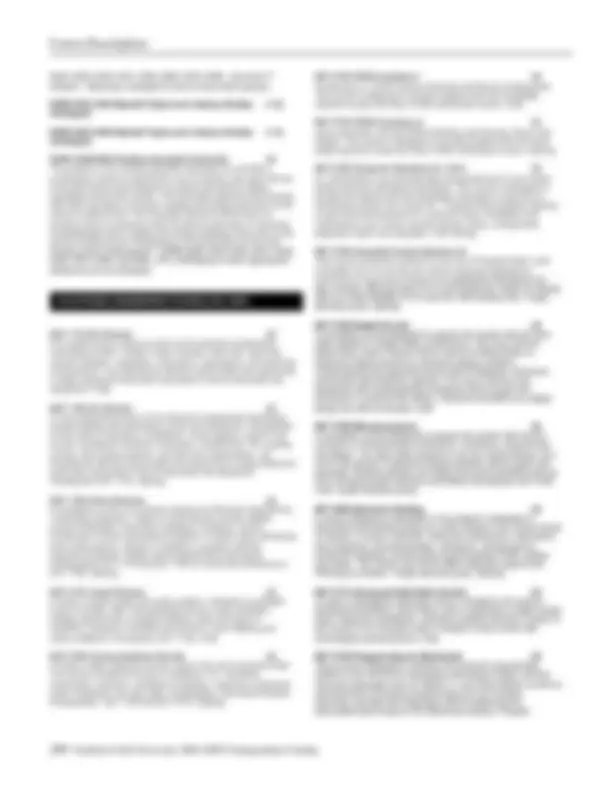
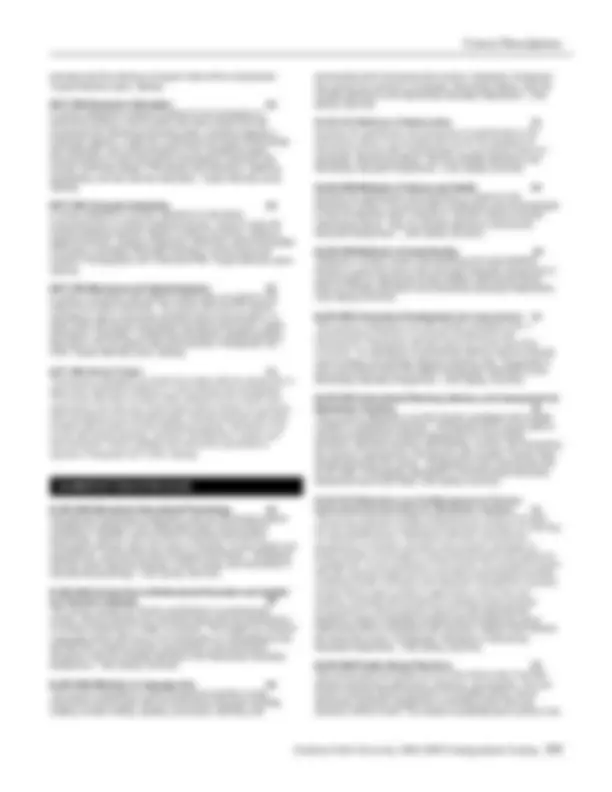
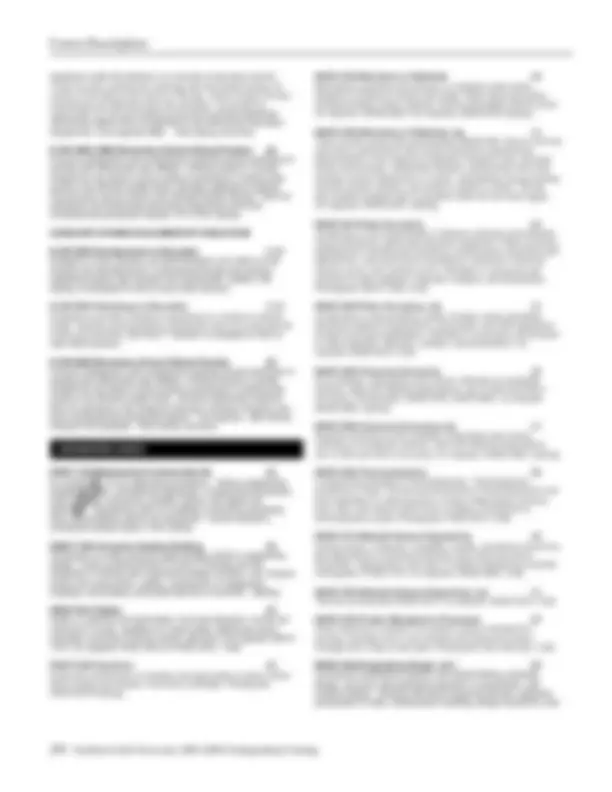
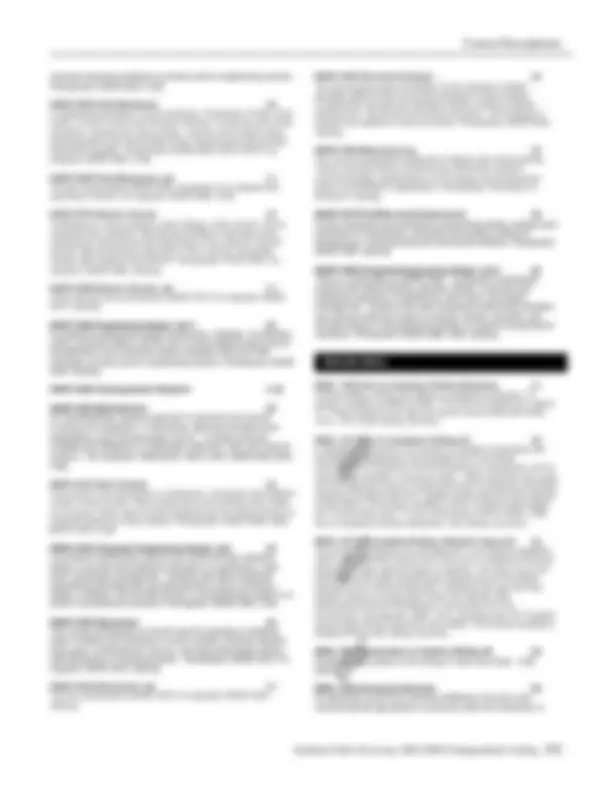
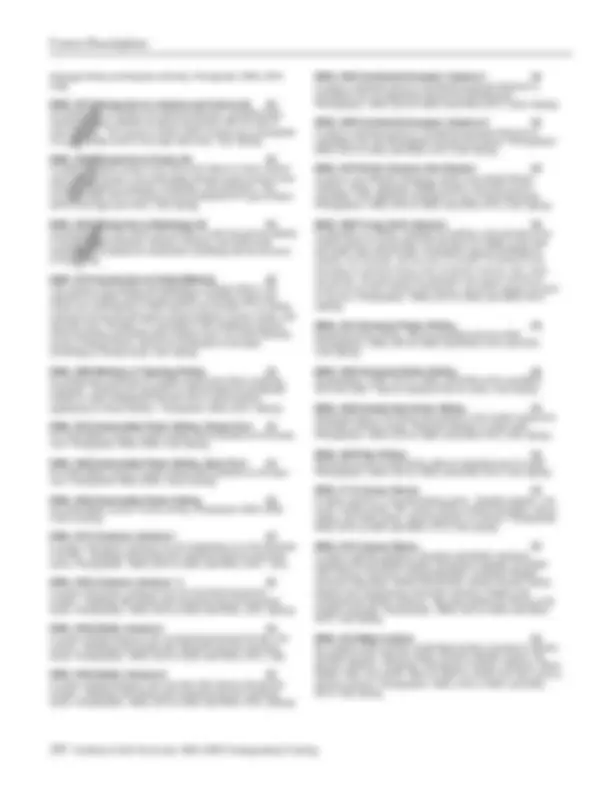
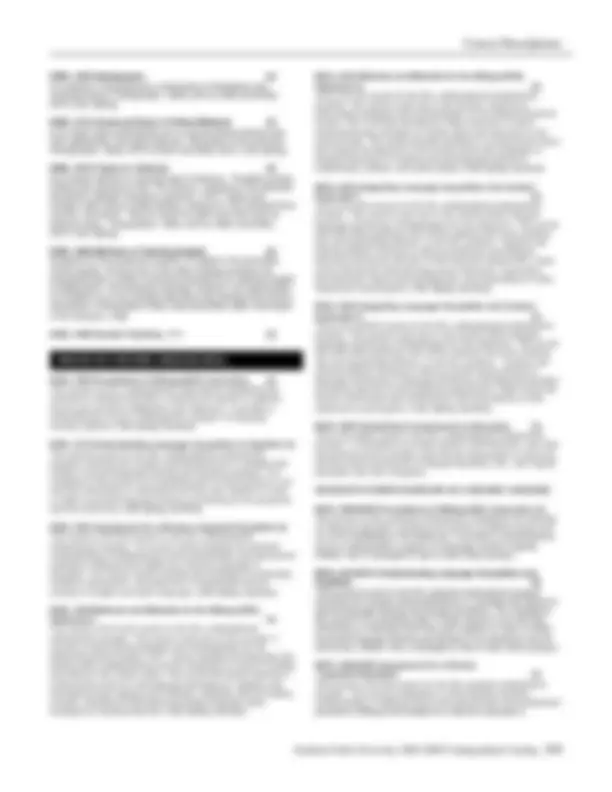
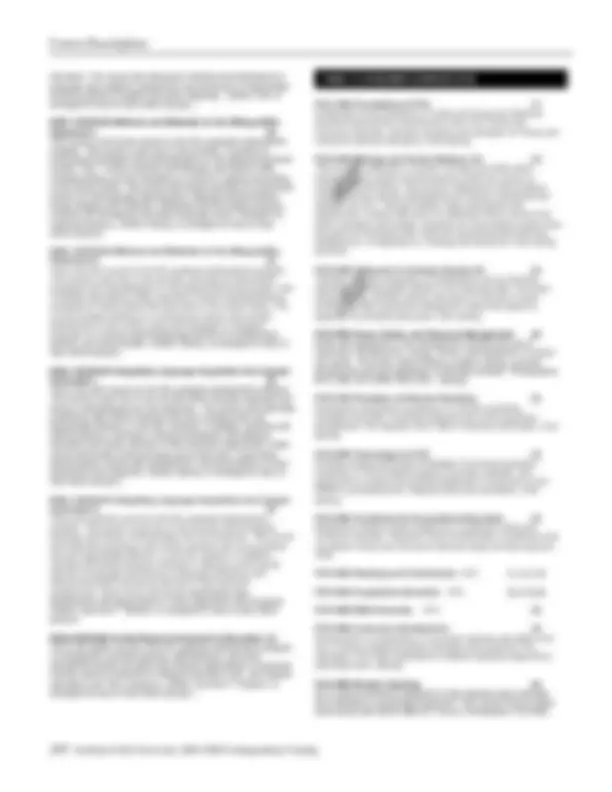
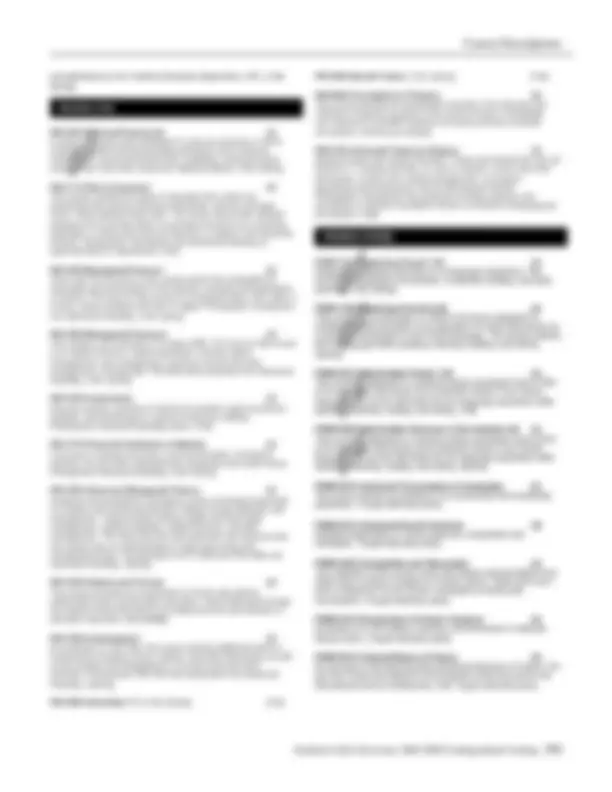
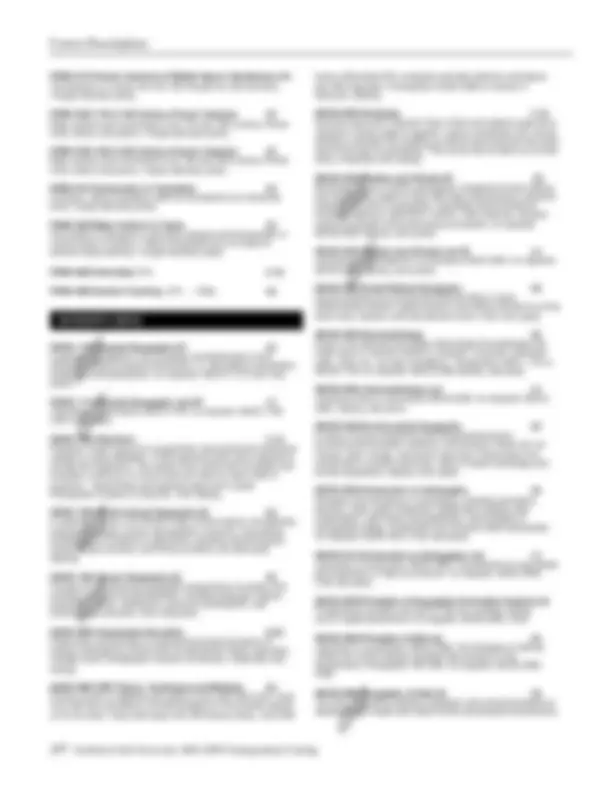
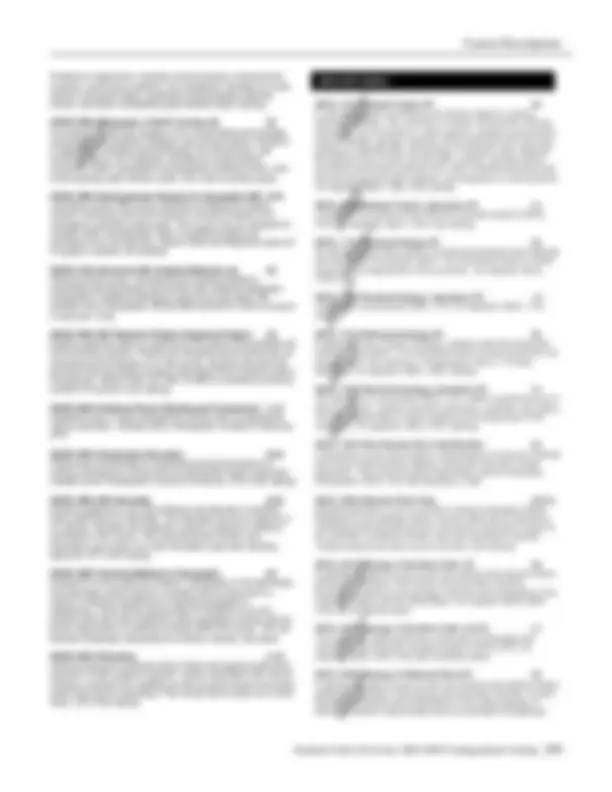
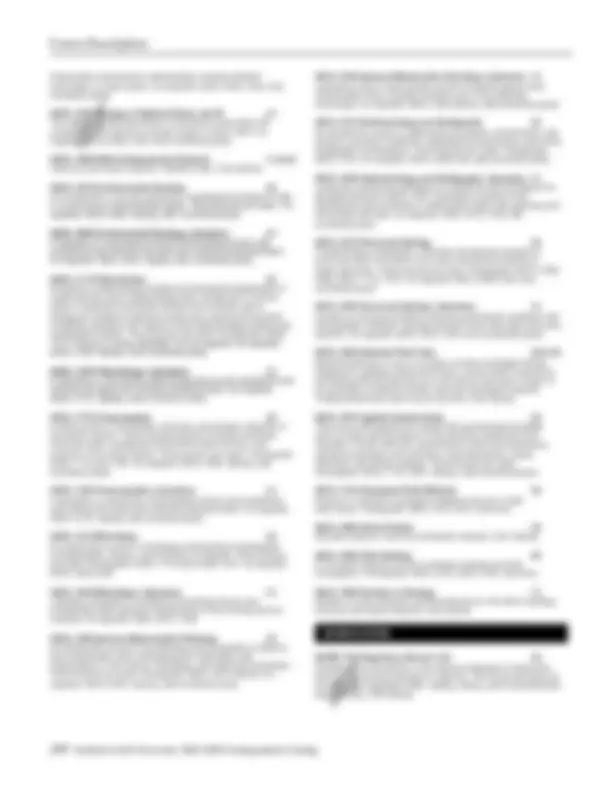
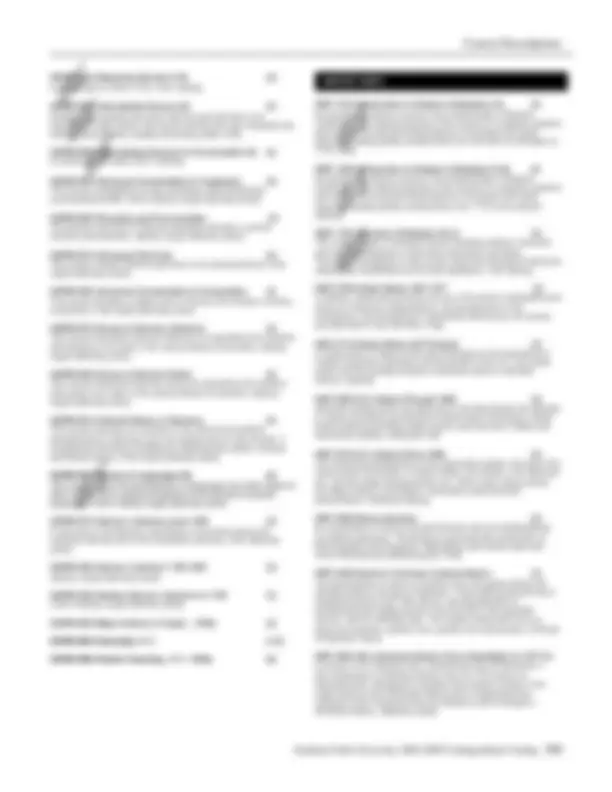
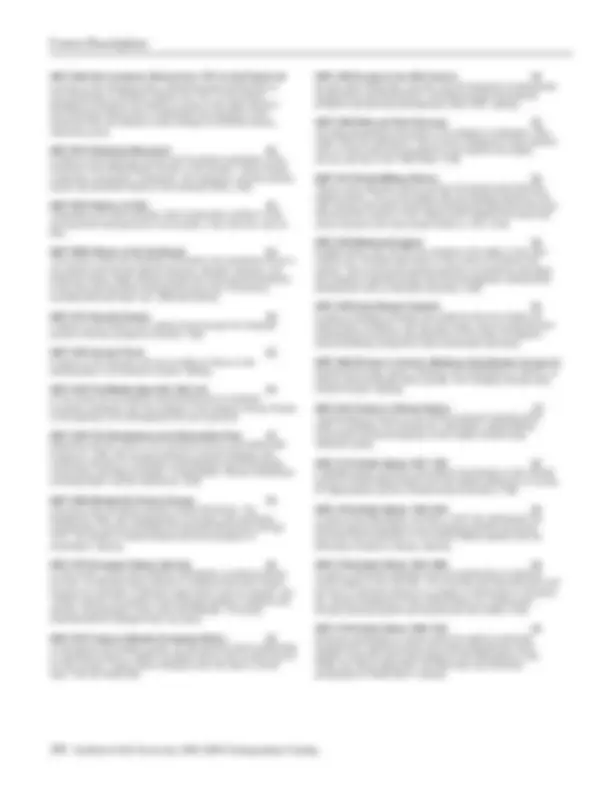
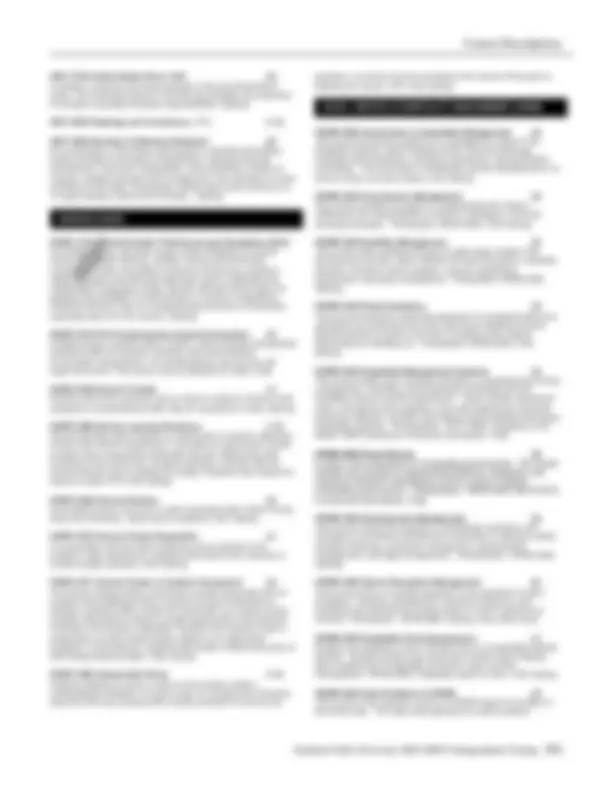
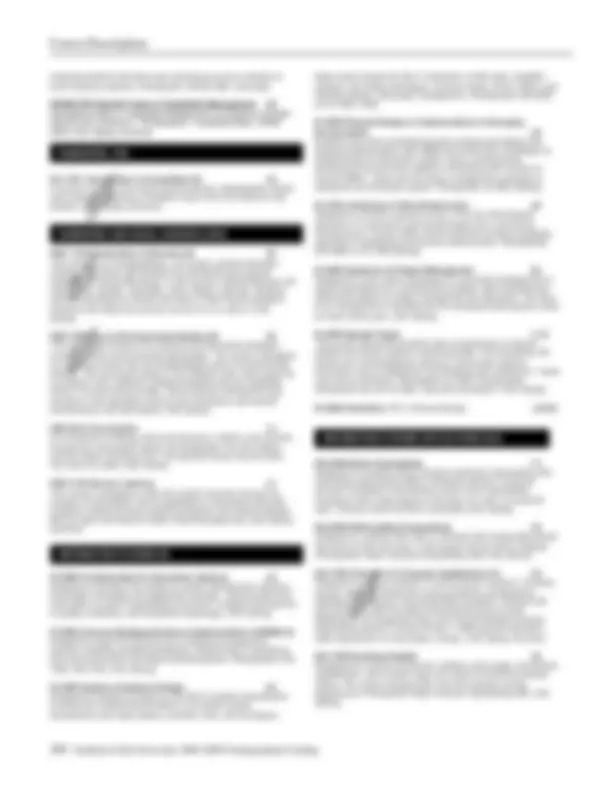
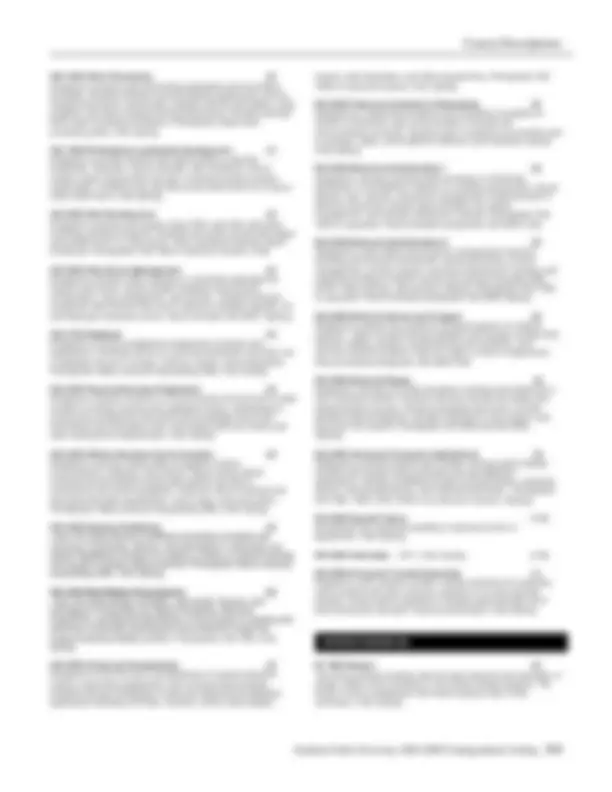
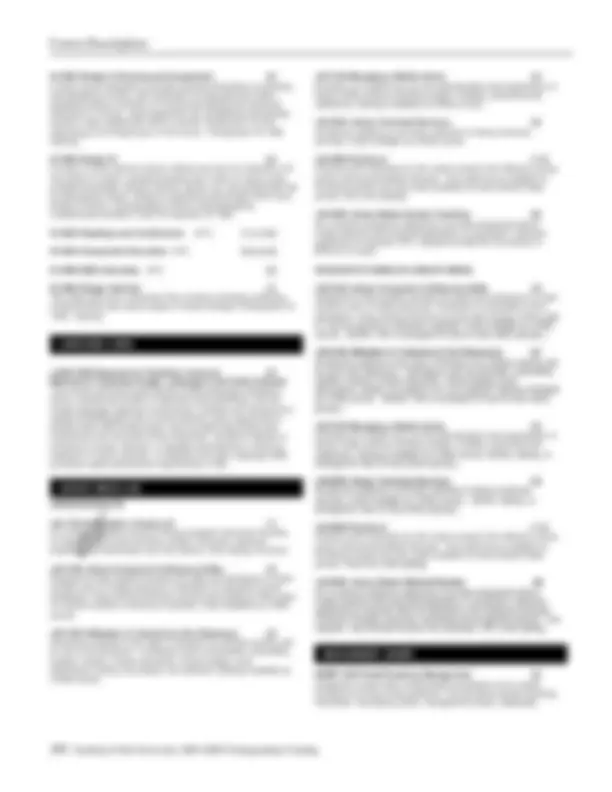
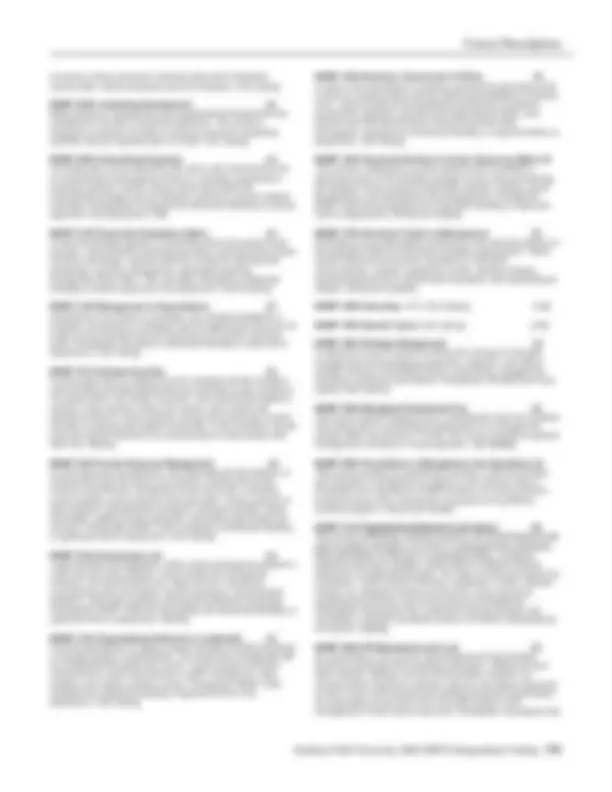
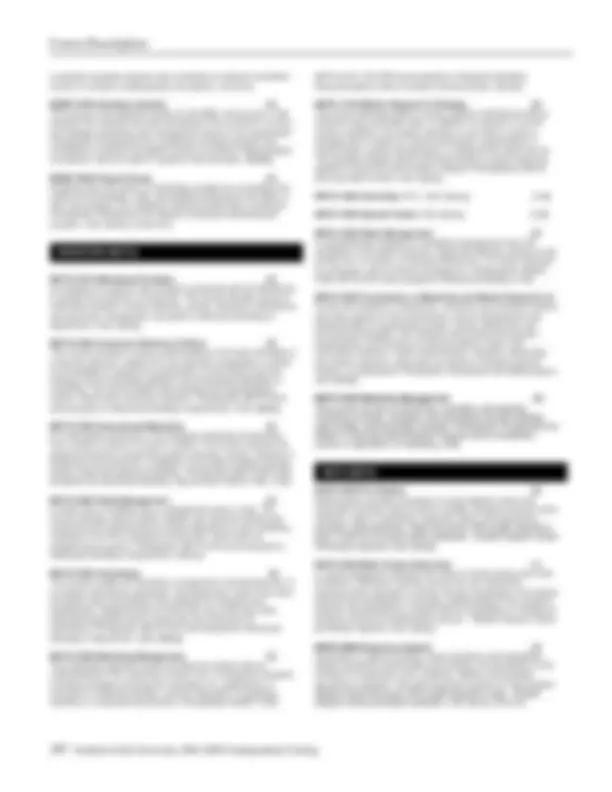
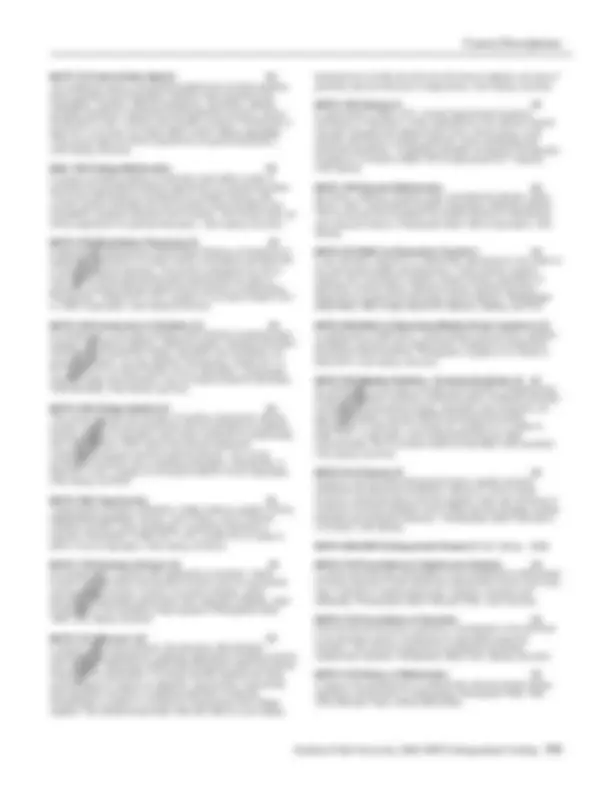
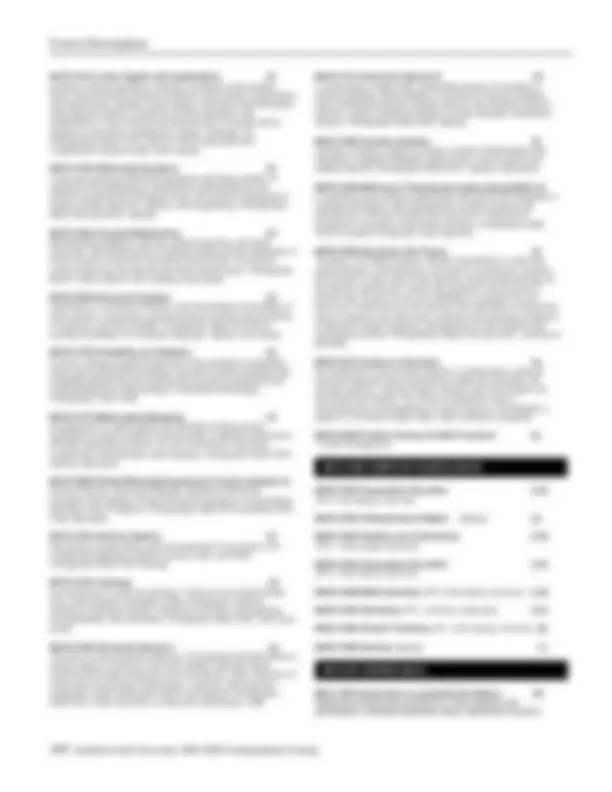
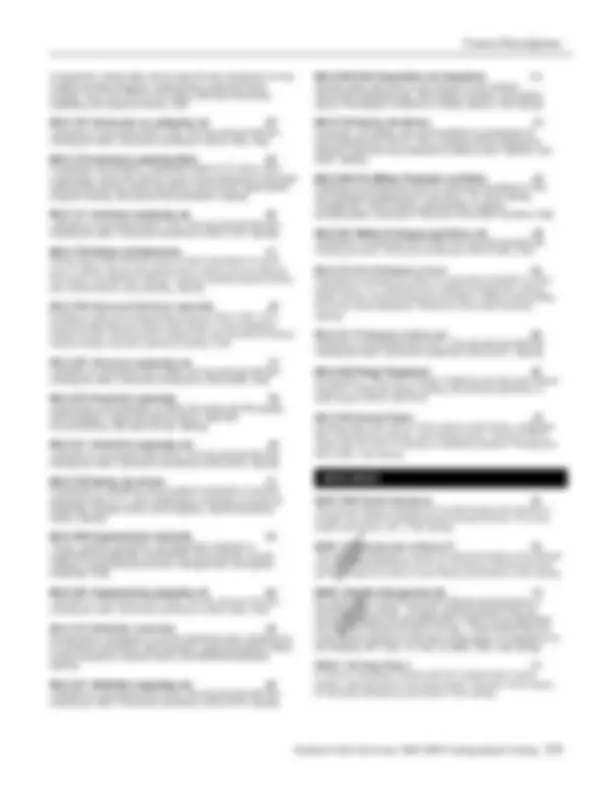
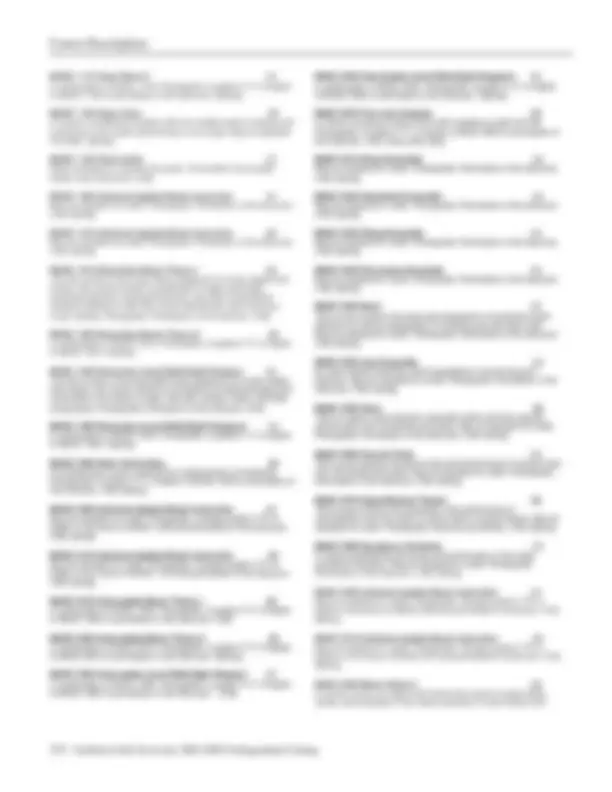
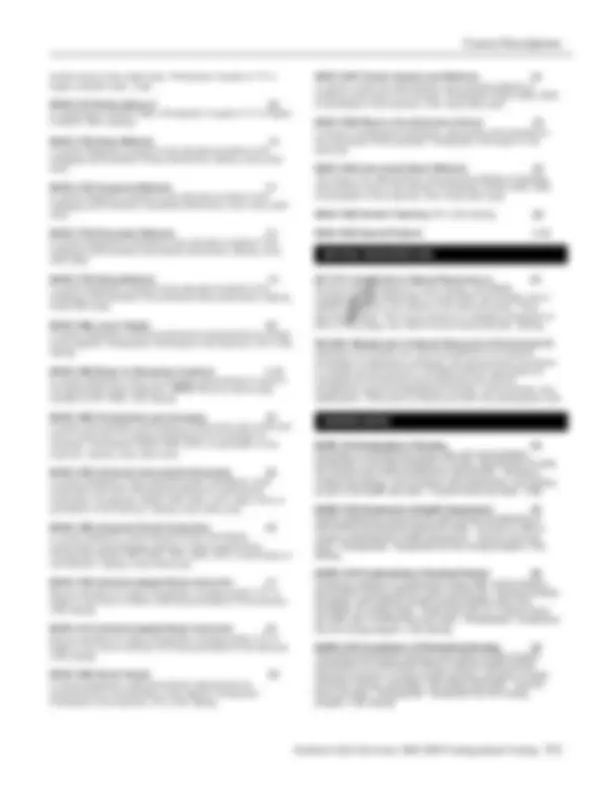
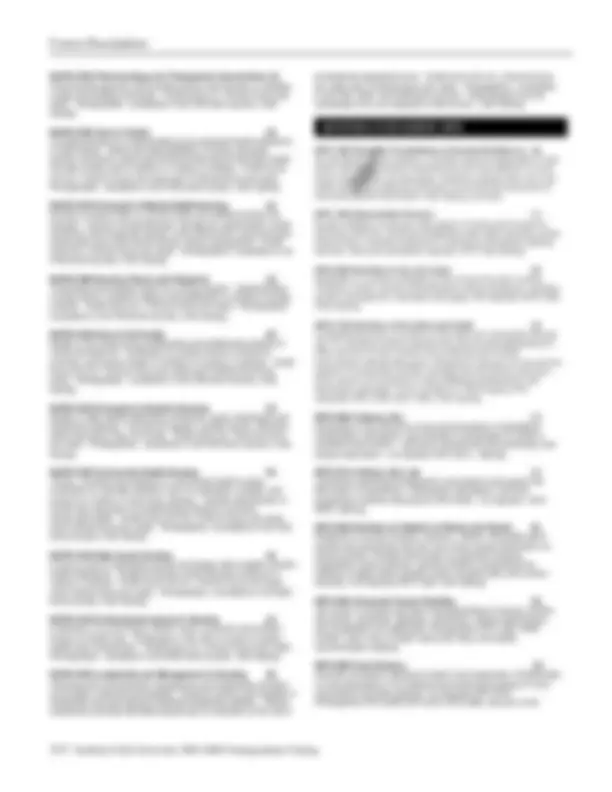
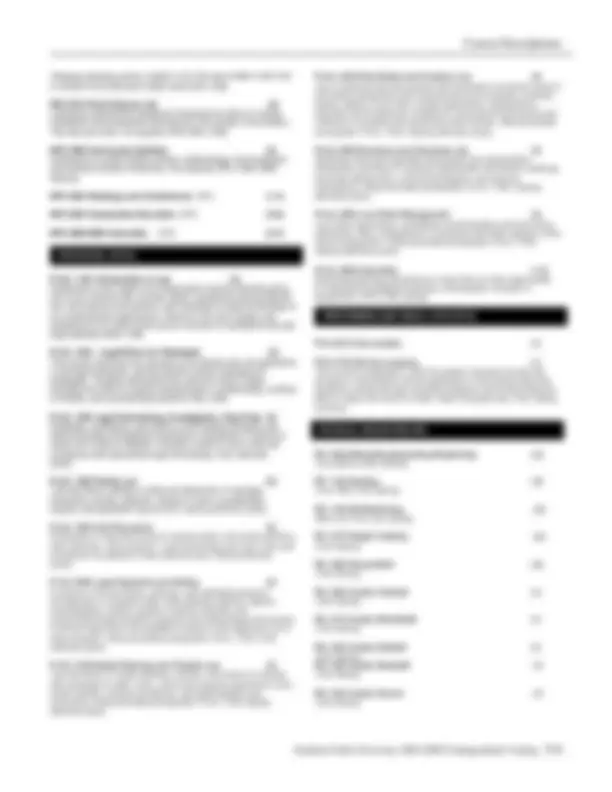
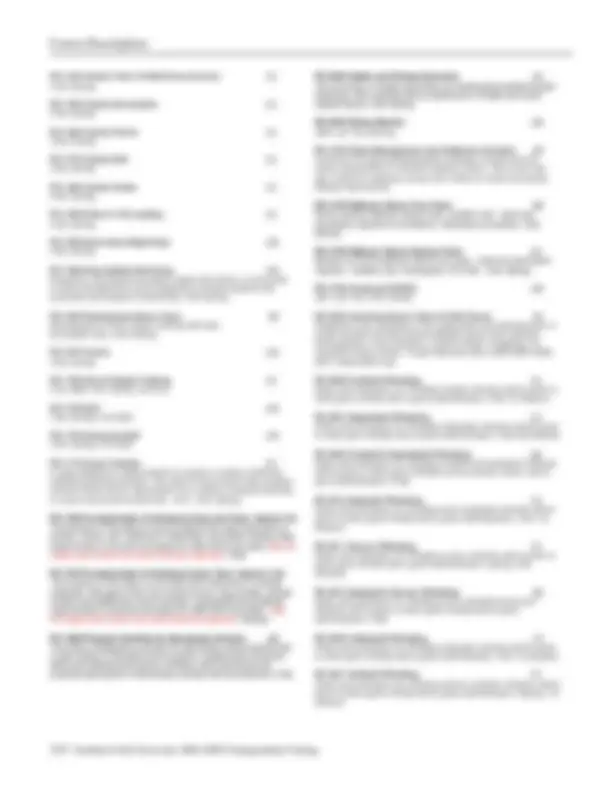
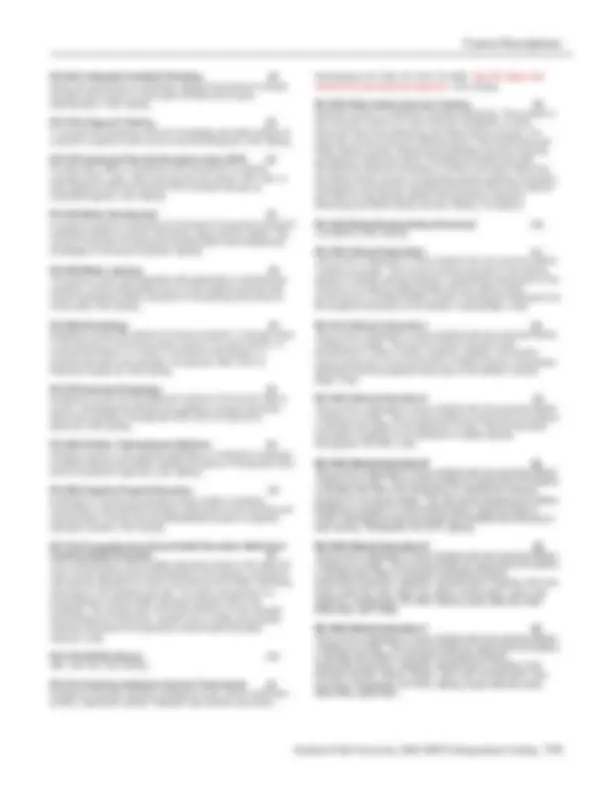
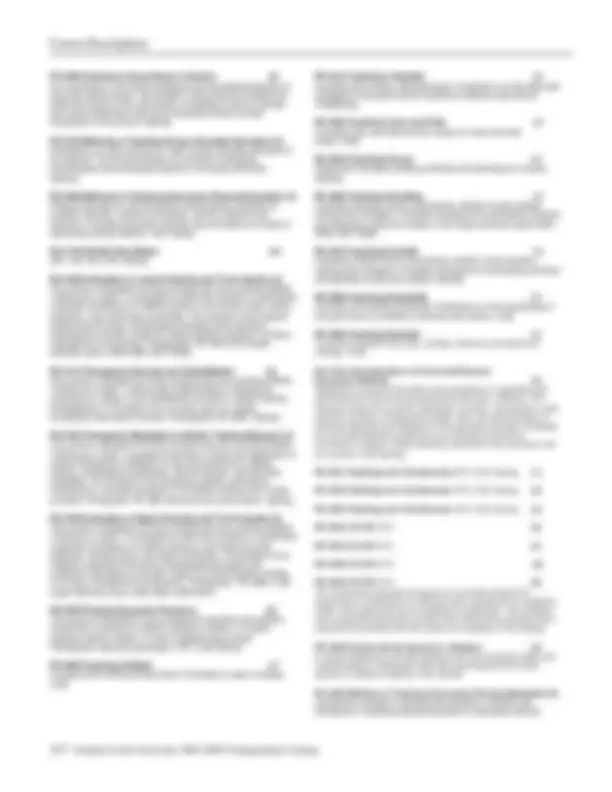
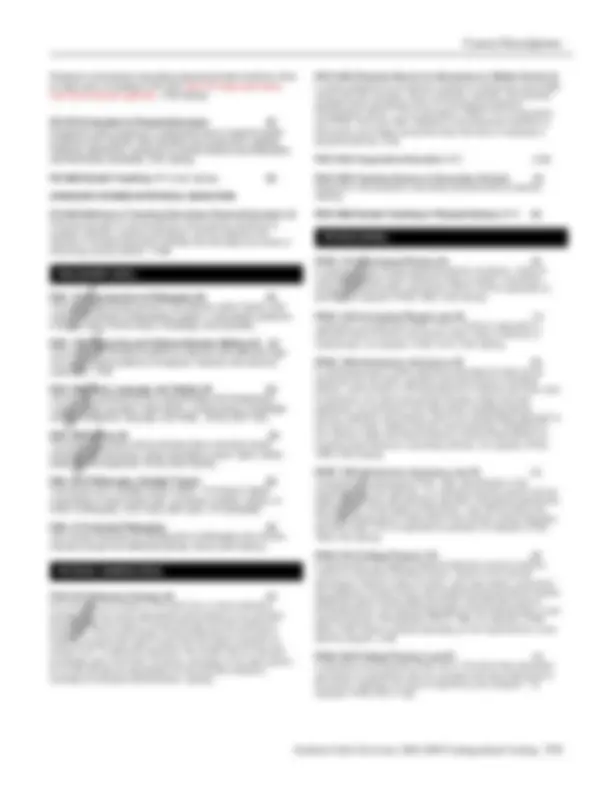
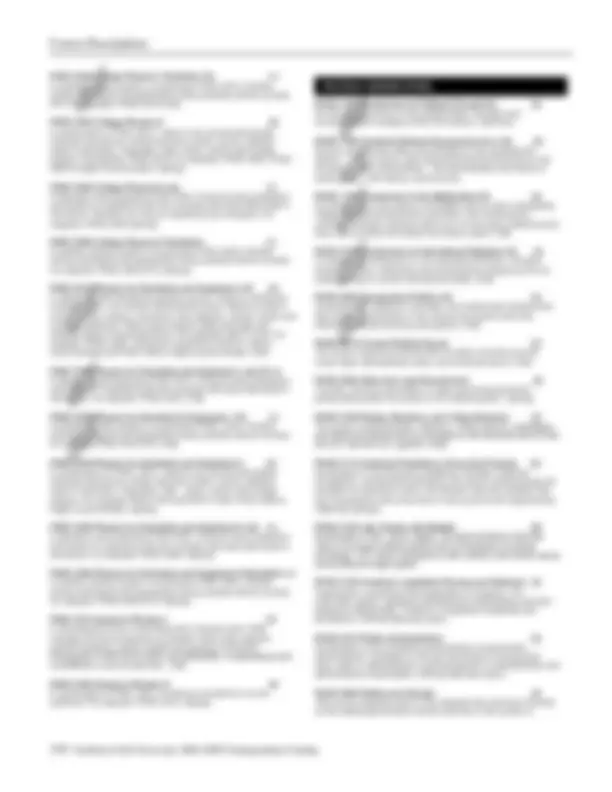
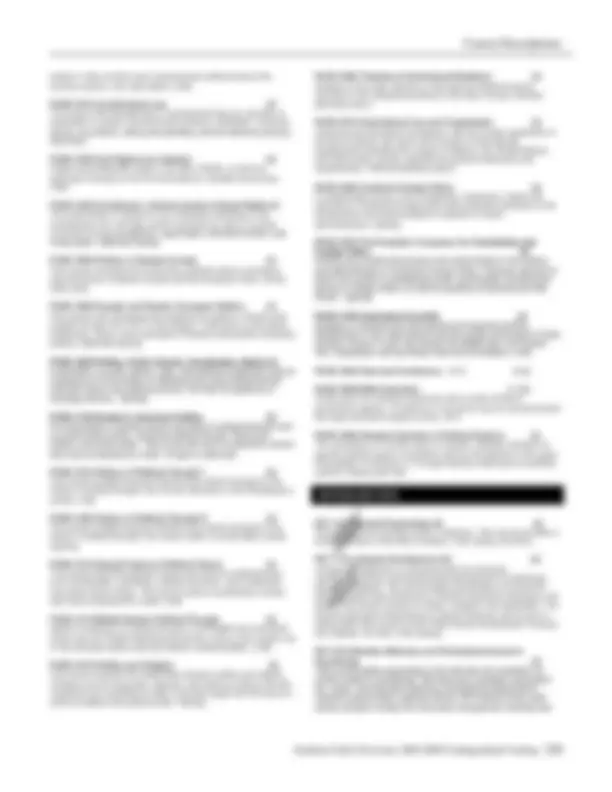
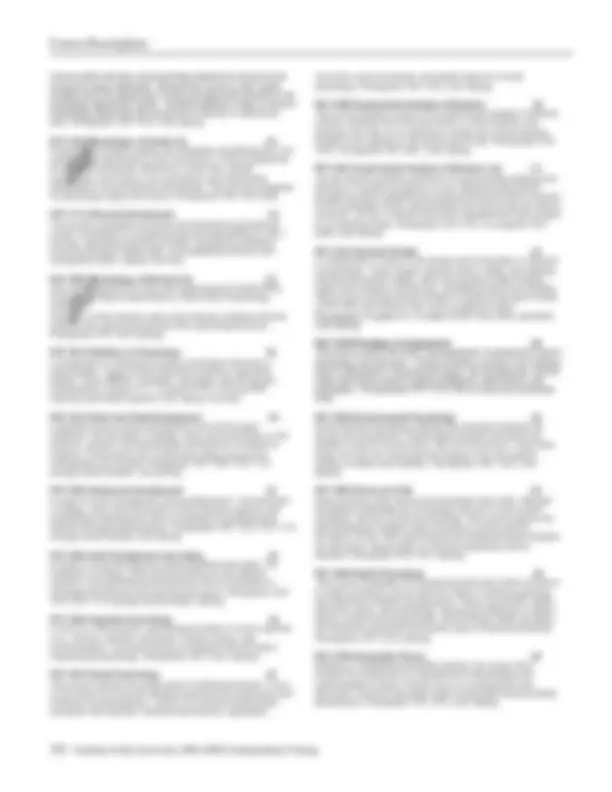
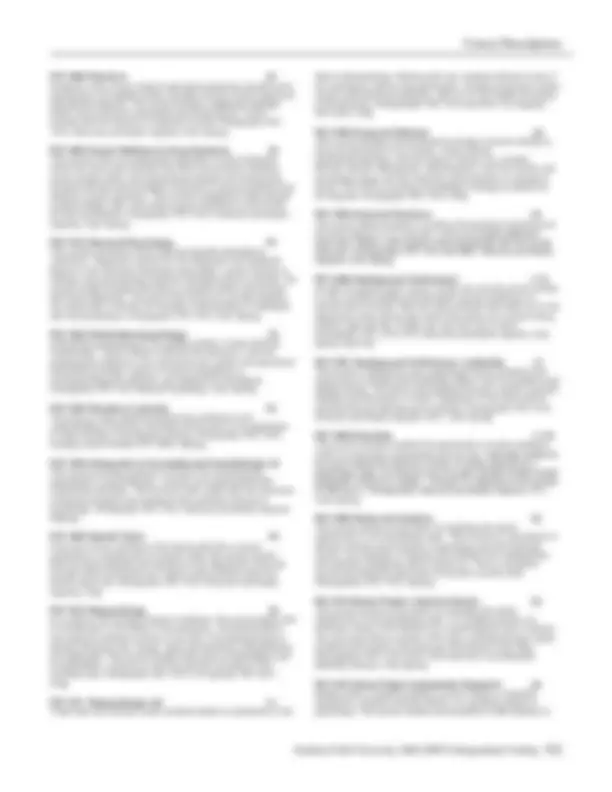
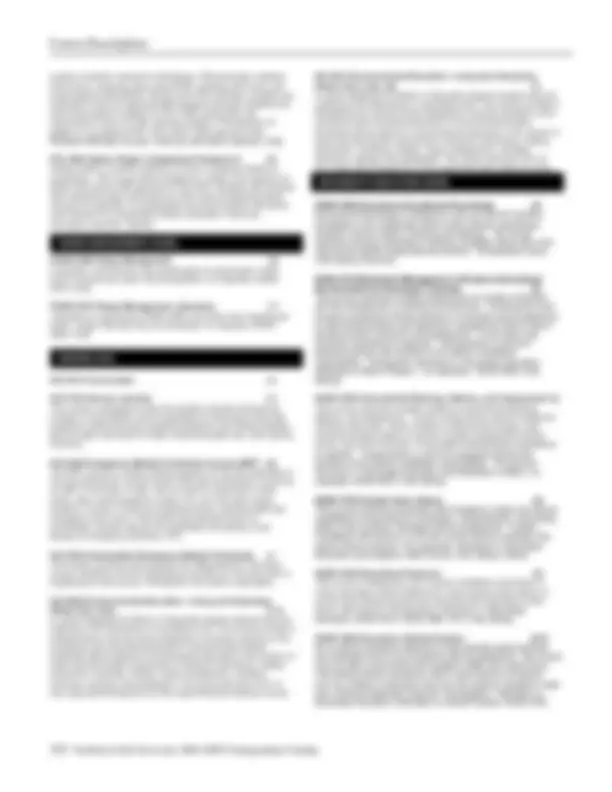
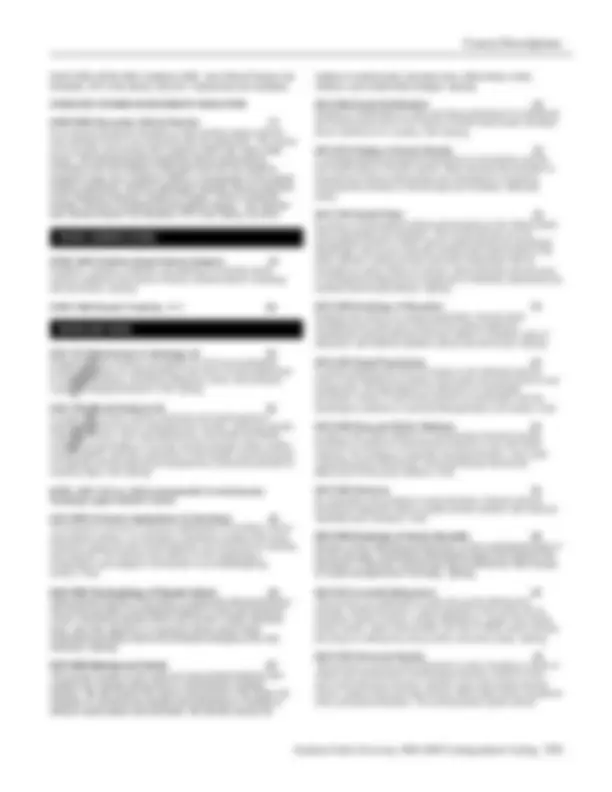
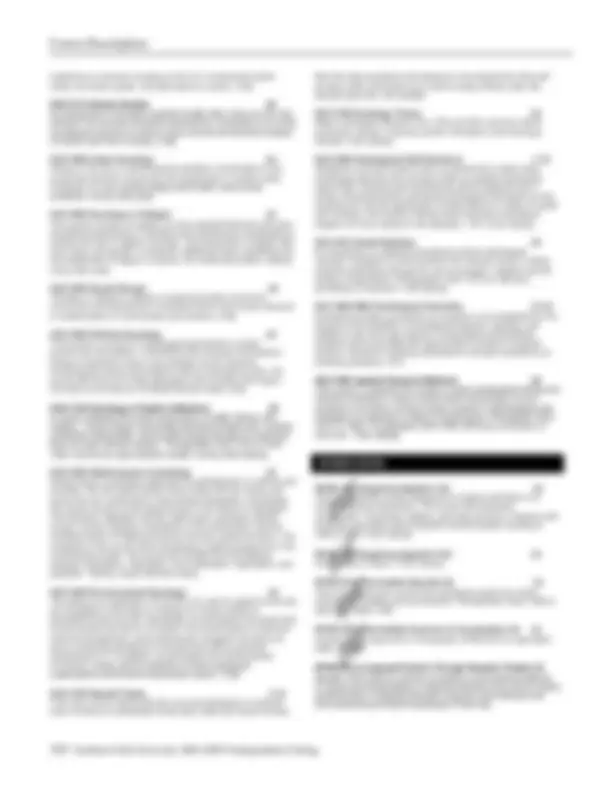
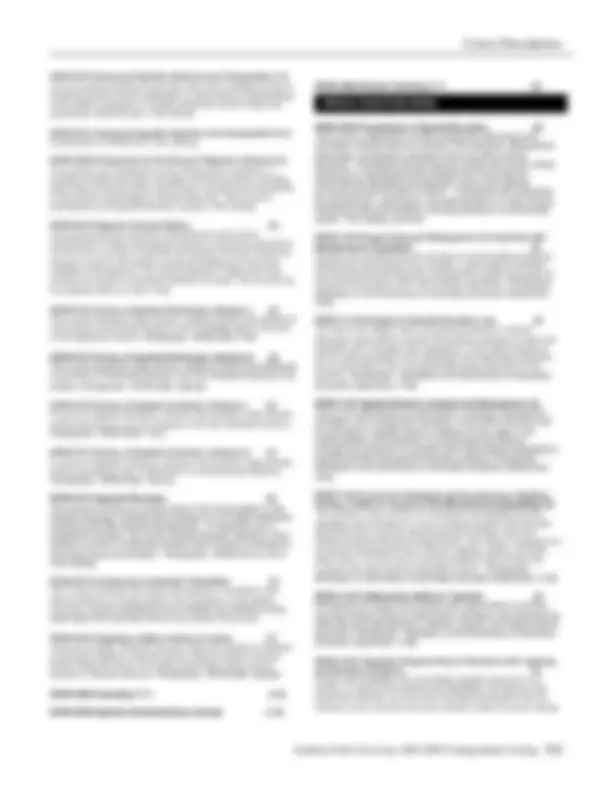
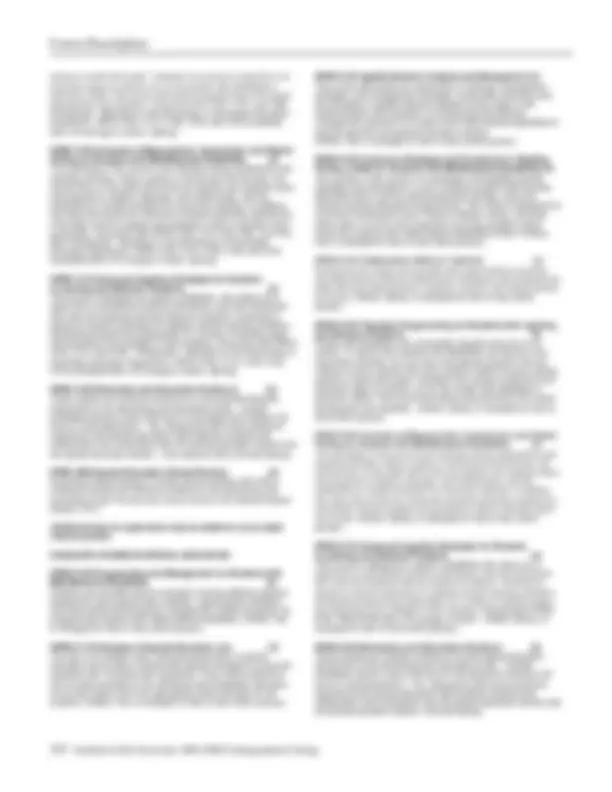
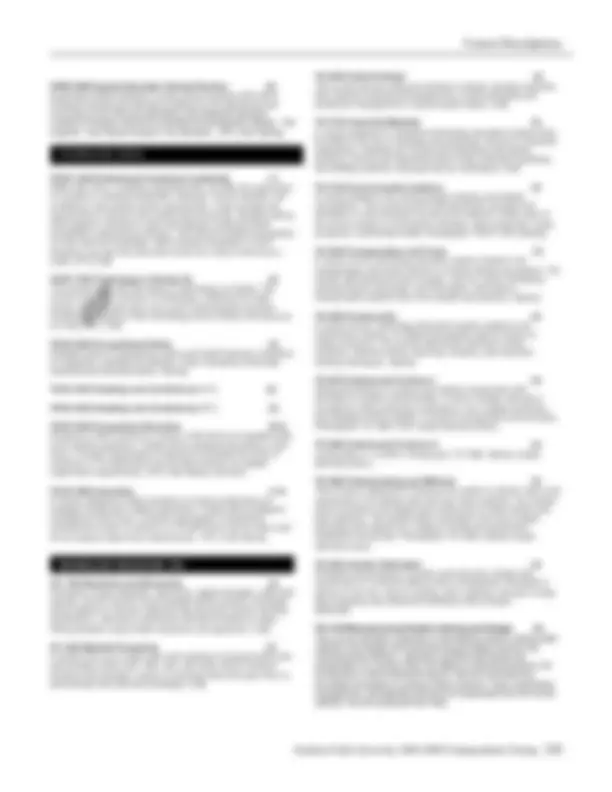
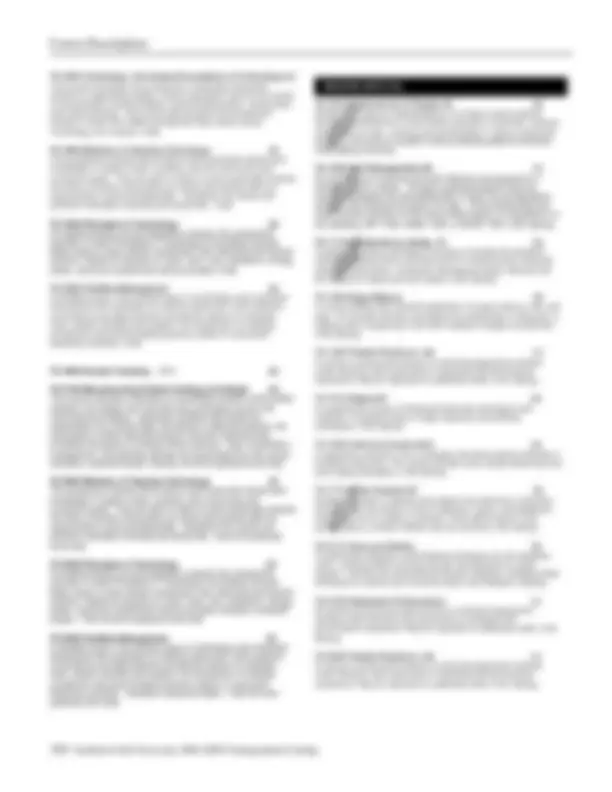
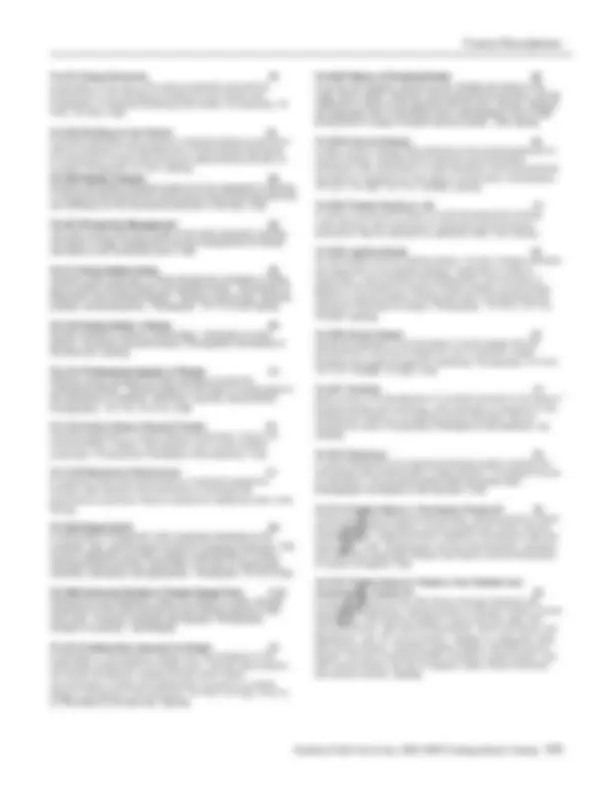
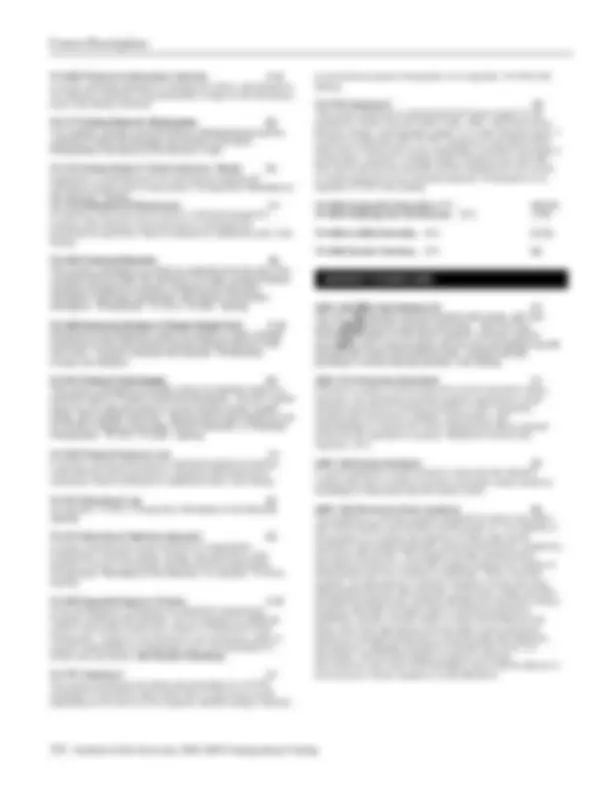


Study with the several resources on Docsity

Earn points by helping other students or get them with a premium plan


Prepare for your exams
Study with the several resources on Docsity

Earn points to download
Earn points by helping other students or get them with a premium plan
Community
Ask the community for help and clear up your study doubts
Discover the best universities in your country according to Docsity users
Free resources
Download our free guides on studying techniques, anxiety management strategies, and thesis advice from Docsity tutors
Material Type: Exam; Class: Accounting Principles; Subject: Accounting; University: Southern Utah University; Term: Unknown 2010;
Typology: Exams
1 / 71

This page cannot be seen from the preview
Don't miss anything!
































































ACCT 2010 Accounting Principles (3) This course provides a thorough study of basic accounting principles. The accounting cycle is introduced using an appropriate mix of conceptual and procedural problems. A real-world problem using computer applications is also covered. This is a basic course, which aids in building a foundation for financial analysis and decision- making. (Fall, Spring)
ACCT 2020 Managerial Accounting (3) A study of the accumulation and flow of managerial accounting information and its impact on decisions within a business entity. Emphasizes cost behavior, cost-volume profit analysis, and management's use of quantitative tools for planning and control. (Fall, Spring)
ACCT 2360 Business Law I (3) In this class students study the origins of the law, parts of the U.S. Constitution, which apply to businesses; the court system, how a lawsuit begins and progresses, torts, contracts, personal property, bailment, and the UCC Article 2 on sales. (Fall, Spring)
ACCT 3010 Financial Accounting I (3) Comprehensive core of accounting knowledge essential to the student entering one of the several areas of the accounting profession. Study of generally accepted accounting principles, the conceptual framework, and financial accounting reporting requirements. Includes in-depth conceptual analysis of the various financial statement elements. Prerequisite: ACCT 2010, acceptance into advanced standing or approved minor in department (Fall, Spring)
ACCT 3020 Financial Accounting II (3) Continuation of ACCT 3010. Prerequisite: ACCT 3010 and acceptance into advanced standing. (Fall, Spring)
ACCT 3100 Accounting Information Systems (3) Students, working in teams, will understand the “traditional” and “state of the art” AIS knowledge. Students will better understand modeling business processes, flowcharting and diagramming techniques, business information and information process rules, risks, and controls, and AIS designing techniques. Advanced Microsoft Access and QuickBooks Pro projects. (Fall, Spring)
ACCT 3200 Tax I (3) A study of current federal income tax laws and preparation of individual income tax rules; Emphasis is on analyzing and interpreting tax rules; developing the ability to research tax rules. Prerequisite: acceptance into advanced standing or approved minor in department. (Fall, Spring)
ACCT 3300 Cost (3) Analysis of costs in a business organization. Includes cost development in both service and manufacturing situations. Areas discussed include: job order costing, process costing, standard costing and variance analysis. Prerequisites: ACCT 2020, acceptance into advanced standing or approved minor in the department. (Fall, Spring)
ACCT 3400 Auditing I (3) This is the first of three semester 3-credit hour courses dealing with auditing: Auditing I, Auditing II, and Fraud Examination. The latter two courses are graduate level courses. This course will study auditing standards, internal accounting control systems, compliance and substantive audit procedures applied to accounts and transaction cycles, and audit reports. Review of the auditing concepts of materiality and risk, types of evidence and documentation, and an
introduction to the ethical and legal responsibilities of the Certified Public Accountant. Prerequisite: ACCT 3020. (Fall, Spring)
ACCT 4030 Advanced Accounting (3) Advanced accounting topics, including business combinations, foreign currency translation, partnership accounting, SEC accounting. Prerequisite: ACCT 3020 and advanced standing. (Fall and Spring)
ACCT 4200 Tax II (3) A study of current federal income tax laws as they apply to corporations. Also includes the preparation of the tax forms for filing a corporate tax return. Prerequisites: ACCT 3200 and advanced standing. (Fall, Spring)
ACCT 4890 Internship (P/F) (Fall, Spring) (1-3)
ACCT 4900 Special Topics (Fall, Spring) (1-3)
ACCT 6000 Foundations of Accounting (3) This course provides an accelerated overview of both the theories and methods of accounting in support of the common body of knowledge core required for all MBA students not having previous business coursework. (As needed)
ACCT 6100 Accounting for Decision-Making & Control (3) This course reviews the development and use of management accounting information systems in planning and control activities. Using case studies of actual companies, its focus is on new management accounting practices adopted by innovative companies around the world. Prerequisite: Acceptance into Masters of Accountancy program or MBA program. (Fall)
ACCT 6240 Estate and Gift Taxes (3) A study of taxation of estates and gifts. Prerequisite: ACCT 4200 and acceptance into the Macc program (Spring)
ACCT 6260 Taxes for Pass Through Entities (3) A study of taxation for partnerships. The course will include choice of entity considerations. Prerequisite: ACCT 4200 and acceptance into the Macc program (Fall)
ACCT 6280 Fiduciary Income Tax (3) Accounting theory and practices of the federal income taxation laws, rules, and regulations to the income taxation of estates and trusts. Prerequisites: Acceptance into Master of program and ACCT 3200 (Spring every other year and Summer)
ACCT 6320 Advanced Cost Accounting (3) Topics include balanced scorecard, cost allocation, profitability analysis, process costing, quality, theory of constraints, capital budgeting, transfer pricing, and performance measurement. Prerequisite: ACCT 3300 and acceptance into Masters of Accountancy program. (Spring)
ACCT 6360 Business Law II (3) To enhance their knowledge of business law, students will study negotiable instruments; secured transactions; debtor- creditor rights and duties; bankruptcy; agency; employment law; insurance law; wills, trusts, and estates; organizational structures such as sole proprietorships, partnerships, limited liability companies, corporations, and franchises; federal securities laws; and accountant’s legal liability. Prerequisites: admission to Masters of Accountancy Program (Fall)
ACCT 6400 Auditing II (3) Auditing II is a continuation of the Auditing I course. The course focuses on the assertion-based audit approach theory, an introduction to audit sampling theory and application, in-depth coverage of the theory of audit program generation, a review of required communications for the vast array of attest and non-attest
functions, and a sophisticated and complex audit case activity with over 400 Microsoft Excel files. The student will improve automated work paper preparation skills and other required auditing communication skills with responsible parties. Prerequisites: ACCT 3400 and acceptance into the Master of Accounting. (Spring)
ACCT 6450 Fraud Examination (3) Fraud examination is a course about the growing science of forensic accounting. The accounting graduate is introduced to the Certified Fraud Examiner's Code of Ethics and information about the forensic accounting industry. The graduate will become knowledgeable about fraud theory, the variety of fraud schemes perpetrated in business enterprises, and how to detect and prevent such fraud. The graduate will become more proficient at diagnostic measures used to identify the possibility of fraud being perpetrated in business entities. Prerequisites: Acceptance into Master of Accounting. (Summer)
ACCT 6600 Practice & Theory Seminar (3) Special accounting problems related to accounting practice and theory, with emphasis on conceptual analysis and historical development of generally accepted accounting principles. Readings cover current theory as well as current accounting issues. Problems requiring in-depth research into pronouncements issued by FASB and predecessor standing-setting bodies are used. Prerequisite: ACCT 3020 and accepted into Masters of Accountancy program. (Spring)
ACCT 6700 Graduate Readings (Fall, Spring) (1-4)
ACCT 6890 Accounting Internship Program (1-3) Experience in accounting functions within industry and government as well as public accounting firms. Prior approval of the instructor required. A maximum of three credit hours will be granted. Prerequisite: Acceptance into the Macc program. (P/F) (Fall, Spring)
ACCT 6900 Special Topics (1-3) Special Topics in accounting. Prerequisite: Acceptance into the Macc program. (Fall, Spring)
ADT 1210 Intro to Apparel Selection and Construction (2) Exploration of historical aspects of clothing and its psychological, sociological and physiological effects. Selection, care, and coordination of wardrobe is examined using individual tastes, lifestyles, and physical attributes. Co-requisite: ADT 1220. (Fall, Spring)
ADT 1220 Intro to Apparel Selection/Const Lab (1) Basic clothing construction techniques for the beginner. Includes experience and skill development using sewing machine, serger, and a variety of fabrics. Co-requisite: ADT 1210. (Fall, Spring)
ADT 1260 Instructional Weaving and Lab (2) Introduction to the fundamentals of weaving through a sampler and individual weaving projects. The basic skills emphasized will be warping, threading, denting and interpreting weaving patterns. Co- requisite ADT 4260. (Fall, Spring)
ADT 2220 Apparel Construction Techniques (3) Application of principles of clothing construction and selection for students majoring in Family and Consumer Sciences. Consideration is given to construction techniques, basic speed, and fitting. Pre- requisite: ADT 1210, 1220. (Spring)
ADT 3240 Textiles and Lab (3) Study of fibers, yarns, fabric construction and finishes as related to selection, use and care. Prerequisite: CHEM 1110/1120. (Fall)
ADT 4210 Advanced Construction/Flat Pattern Design (3) Demonstration and practice in pattern making including traditional and technological methods. Practice in designing various garment features and styles. Creative and advanced construction skills will be developed. Research, demonstration, consumer skills, and experience with specialty techniques and fabrics will be required. Prerequisite: ADT 2220. (Fall)
ADT 4260 Advanced Weaving Instruction (2) Emphasis will be on designing and improving basic weaving skills learned in beginning weaving class. Projects will be selected by students. May be repeated for credit (ADT 4270). Pre-requisite: ADT
ADT 4270 Advanced Weaving Instruction (4) A continuation of the knowledge learned in ADT 1260/4260, including planning and executing weaving projects from beginning to end. Emphasis will be placed on designing profile drafts and understanding basic weave structures, enabling one to weave original patterns. May be repeated for credit. Pre-requisite: ADT 1260, 4260. (Fall, Spring)
ADT 4830 Readings and Conferences (P/F) (1-9)
ADT 4840 Cooperative Education (P/F) (1-9)
ADT 4890/5890 Internship (3)
AGSC 1010 Agriculture and Society (L) (3) This course is designed to increase the student’s awareness of the significant role agriculture plays in today’s society, covering areas of science, economics, politics, culture and history. Agriculture topics are used to teach critical thinking skills and other problem-solution methodologies. Will satisfy the general education Life Science requirement. (Spring)
AGSC 1100 Principles of Animal Science (L) (3) A survey of scientific principles applied to the production of agricultural animals and the products they yield. The course is a series of instructional modules covering domestic animal products and bio-economics, health and behavior, genetics, reproduction, and feeding and nutrition. Will satisfy general education – life science requirement. (Fall)
AGSC 1110 Crop Production (3) A general course involving the principles and practices used in the production of agronomic crops. Will cover small grains, corn, legumes and root crops. (Spring)
AGSC 1120 Crop Production Lab (1) Application and hands-on experience of concepts covered in the lecture. Co-requisite: AGSC 1110. (Spring)
AGSC 1750 Horsemanship I (1) A basic course in the riding and handling of horses. An understanding of horse behavior and safe conduct around horses are central to the course. Students will be introduced to the fundamentals of riding, handling, and grooming, as well as becoming familiar with the parts of the horse, common tack, and grooming equipment. Horse boarding available. Limited enrollment. May be repeated for credit. (Fall, Spring)
AGSC 1950 Agricultural Enterprise Practicum-Production (1-4) Practicum credit is given for a supervised, structured work experience related to farming or ranching, agribusiness, veterinary or agricultural science situations. The experience may be provided at the SUU Farm or another approved work site. The student must confer with an
AGSC 3500 Applied Reproduction in Livestock and Horses (3) Macro and micro functional anatomy of reproduction in livestock and horses. Includes theories and applied methodologies for increasing the reproductive efficiency of the animals upon which the course will focus. Prerequisite: AGSC 1100. Co-requisite: AGSC 3510. (Spring)
AGSC 3510 Applied Reproduction in Livestock & Horses Lab (1) Required in conjunction with AGSC 3500. A group research project is required. (Spring)
AGSC 3560 Soils (3) A general study of soil formation, chemical and physical properties, soil water, soil biology, classification and taxonomy, fertility and soil conservation. Prerequisite: College chemistry or the equivalent. (Fall)
AGSC 3570 Soils Lab (1) Required in conjunction with AGSC 3560. (Fall)
AGSC 3600 Directed Studies in Agriculture (3) Discussions and projects dealing with contemporary issues and challenges, science, technology, or economics related to agriculture. Students may apply for and receive Directed Studies credit by submitting a proposal or being assigned a project, searching the literature, carrying out the project, and reporting the results at a seminar. Prerequisite is advanced standing in an agriculture component program and sufficient reference courses related to the project as determined by a faculty adviser. (Fall, Spring, Summer)
AGSC 3700 Principles of Irrigation (3) Study of irrigation history, irrigation methods, watersheds, irrigation equipment and structures, soil moisture determinations, irrigation scheduling, water rights and water law. Will cover the design of residential and commercial turf as well as large scale agriculture systems. (Fall)
AGSC 3710 Irrigation Lab (1) Required in conjunction with AGSC 3700.
AGSC 3750 Horsemanship III: Advanced Performance & Training (1) An advanced riding course focusing on equine behavior and learning. Development of sound riding and training practices will be stressed. Limited enrollment. Horse boarding available at university farm. Prerequisite: AGSC 2750 or instructor permission. May be repeated twice for credit. (Fall, Spring)
AGSC 4890 Agricultural Internship (2-8) Designed to provide specific on-the-job training which requires an understanding of agricultural sciences and industry expected of students who have taken upper division course work and /or who have advanced standing in an agricultural program. Requires 3 hours work per week per hour credit. Internship site must be pre-approved at the agriculture program faculty level. (P/F) (Fall, Spring, Summer)
AGSC 4920 Workshop in Agriculture (1-3) Designed to give credit for intensive agricultural learning situations outside of the traditional class and lab. Students may receive workshop credit for activities such as seminars, short courses, in- service training, and travel study. Workshop credit must be arranged by an agriculture program faculty member and receive approval at the departmental, as well as the college level. Pass/Fail Grading. (Fall, Spring)
AGSC 4990 Agricultural Seminar (1) Required of all students who will receive a four-year agriculture component degree. This is capstone course which takes a broad overview of agriculture as a profession and looks at employment opportunities from the perspective of current trends and
developments. Students may substitute other seminars or workshop courses with prior adviser approval. (Fall, Spring)
ASL 1050 American Sign Language I (H) (2) A course designed for students with no previous knowledge of ASL and deaf culture. This course develops basic skills in ASL vocabulary, grammar, and use.
ASL 1060 American Sign Language II (H) (2) A course designed for students with some knowledge of ASL and deaf culture. To continue basic methods in ASL vocabulary, grammar, and use. Prerequisites: ASL I or teacher's permission.
ASL 2050 American Sign Language III (2) This course is designed to develop intermediate ASL conversational skills in a variety of settings, topics, and functions. Introduction to interpreting theories, principles, and special settings of interpretation. Prerequisites: ASL I and ASL II or teacher's permission.
ASL 2060 American Sign Language IV (2) This is the final course in the ASL series. This course is for students who have passed levels I-III and would like to continue on or would like to improve their translation skills.
AST 2010 Convocation (1)
AST 2120 Service Learning (1) This course is designed to take the student volunteer through the process of volunteerism and its application to themselves and their academic training through practical experience and critical reflection. May be taken two times for credit. Pass/Fail grade only. (Fall, Spring, Summer)
ART 1010 Introduction to Art (F) (3) An art orientation. A study of the principles and ideas underlying visual art expression and a survey of major periods, styles, and artists. Illustrated lectures. (Fall, Spring)
ART 1040 Arts Retrospective (D) (1) An examination of how the arts both influence and respond to a societal epoch or theme. Through a selected specific topic the course investigates the interrelationship of three fine art disciplines and how they express the spirit of an age. (Three interlocking one- credit courses combine for this three-credit inquiry) Co-requisites 2 of the following: TA 1040, DANCE 1040, or MUSC 1040. (Fall, Spring)
ART 1110 Drawing I (F) (3) A studio class which explores the elements and compositional principles of visual art through drawing. Assignments are designed to encourage creative solutions, develop drawing skills, and apply the basics of linear representation, shading, perspective, shape (negative and positive) and textural depiction. (Fall, Spring, Summer)
ART 1120 Two-Dimensional Design (F) (3) A study of design fundamentals with an application in two- dimensional media. Presents the basic design principles and elements employed in all visual expression. (Fall, Spring, Summer)
ART 1240 Three-Dimensional Design (3) A foundation design course in which the basic principles and vocabulary of visual organization in three dimensions are explored
through a series of studio problems, i.e., sculptural and spatial problems. Prerequisite: ART 1110 and 1120. (Spring)
ART 1300 Art Major Seminar (.5) Students meet once weekly for seminars featuring professionals in visual art; artists, curators, educators, critics and art administrators. Through lectures, discussions, demonstrations, critiques and hands on experience, students will be introduced to current issues and the practical realities facing professionals in the visual arts. Art majors must repeat this class eight times (transfer students must enroll every semester) for a total of 4 credit hours. (P/F) (Fall, Spring)
ART 1610 Ceramics I (F) (3) Explore creative solutions and aesthetic ways of working using clay as a medium in a series of studio projects designed to acquaint the student with basic hand-building, throwing, trimming and glazing techniques. Particular attention is paid to the essential skills of creative problem solving and expression, creative thinking, and spatial reasoning. Taught each semester. (Fall, Spring, Summer)
ART 2110 Drawing II (3) A continuation of approaches and techniques in drawing. Emphasis will be placed on design, composition, subject, content, experimental, and color drawing. Prerequisite: ART 1110. (Fall)
ART 2210 Digital Imaging (3) Basic course in the study and uses of the computer as a visual arts medium. Training will be given in various software directed toward the production of art and design. (Spring)
ART 2410 Painting I (3) Introduction of painting material and techniques as well as a brief history of painting with the focus on the theory and process of color mixing and color matching. Prerequisites: ART 1110, 1120. (Fall).
ART 2710 Art History I: Ancient (F) (3) A contextual survey of Prehistoric art in Europe, and of art from the ancient Near East, Egypt, the Aegean, Greece, Etruria, and Rome, and of Early Christendom including art of Byzantium. From paradoxically crude and sophisticated beginnings arise the earliest forms of architecture, pictures, and sculpture which develop into the widest possible diversity of images, ranging from the stylized, graceful Cycladic forms to the hyper-realism of Roman portrait sculpture. There will be exploration of common themes such as the propagation of religious and political views and the exchange of ideas, as evidenced in borrowed visual motifs. (Fall, alternate years)
ART 2720 Art History II: Ages of Faith (F) (3) A study of Islamic art, the early art of India, China, Japan, the Americas, and Africa, and from Medieval Europe including the Romanesque and Gothic periods. The non- European art will be perused from its earliest manifestations through what might be termed an early medieval period, which will vary with each civilization, and end with a major cultural or political shift, such as the end of the Song Dynasty in AD 1279, in the case of China. The Medieval European section will focus on the “Age of Faith,” including some non-Christian influences and rivals, most notably Islam, and then concentrate on the Christian art of Europe from the “Golden Age of Ireland.” (c. AD 500) through the Gothic cathedrals and the beginning of the age of painting, ushered in by Giotto. (Spring, every other year)
ART 2730 Art History III: Rebirth, Reason & Regalia (F) (3) A counterpoint of Western artistic traditions from the fifteenth, sixteenth, and seventeenth centuries against the art of India, China, Japan, and the Americas from roughly the same time. This course will present the conquest of pictorial space that developed in the Renaissance and extended through the Baroque era. It will include forays into the areas of sculpture, architecture, and craft arts and will
contrast all this with the very different sensibilities of the selected Eastern cultures and some native New World cultures. (Fall)
ART 2740 Art History IV: Modern (F) (3) An introduction to art from Pacific cultures and Africa in the modern era followed by a survey of modern art in Europe and the United States beginning with Neoclassicism and the French Revolution and continuing through the many subsequent artistic revolutions, noting the impact from the Pacific and Africa and the infusion of their motifs into Western images which profoundly influenced the development of modern art. (Spring, every other year.)
ART 3080 Gallery and Museum Practices (3) Fundamental concepts of gallery and museum practices including in- depth study of the nature of objects, interpretation of objects, and administration responsibilities. (Fall)
ART 3110 Life Drawing & Anatomy (3) A study of the bones and subcutaneous muscle structure of the human body with an emphasis on the needs of the artists. Objective and interpretive drawing. Prerequisites: ART 1120, and ART 2110. (Spring)
ART 3210 Layout and Typography (3) A course designed to provide training in the use of text and image and their function in graphic design. Prerequisites: ART 1120, and ART 2110. (Fall, Spring)
ART 3220 Digital Photography (3) This course is designed to give students the skills to explore a wide variety of photographic solutions to graphic design problems using the digital camera, the computer, and digital printers. (Fall, Spring, Summer.)
ART 3230 Graphic Design I (3) A course designed to aid students in the development of creative concepts and techniques in graphic design. Prerequisites: ART 1120, ART 2210 or approval of the instructor, ART 3210 (can be taken concurrently) (Fall, Spring)
ART 3240 Typography II (3) This course builds on the basics addressed in Typography and Layout. Students will gain further understanding of typographic principles through exploration and refinement of their skills to solve complex communication problems in a variety of media. Prerequisites: ART 2210, ART 3210, ART 3230. (Fall, Spring, Summer.)
ART 3250 Web Design I (3) An introduction to the design of web sites in both functionality and visual appeal. Prerequisites: ART 2210 or approval of instructor. (Fall, Spring)
ART 3260 Publication Design (3) Publication Design explores the structure of magazines, newspapers, books, and annual reports. This course will examine page layout, typography, pacing, sequencing, the hierarchy of information, and the visual/verbal relationships between text and images on the printed page. Prerequisites: ART 3210, ART 32230. (Fall, Spring, Summer.)
ART 3270 Packaging Design (3) Students will develop the skills and understanding of how two- dimensional graphics work and apply onto three-dimensional objects. First students will experiment with shapes and construction to develop manual skills; then they will solve pragmatic packaging assignments. Prerequisites: ART 3210, ART 3230. (Spring, Summer.)
show to their faculty adviser. Faculty approval is required to take this course. (Spring)
ART 4890/5890 Internship (P/F) (3-12)
ART 4900 Art for Secondary Teachers (3) Methods and theories in teaching art on the secondary level. Applied problems in motivation, evaluation, discipline, curriculum, and rapport. Professional education requirement for majors in secondary art education. (Fall).
ART 4980 Student Teaching (P/F) (2)
ART 4990 Senior Seminar (1-4) Individual advanced work in one of the following studios as approved by the instructor: design studio, painting studio, graphics studio, sculpture studio, ceramics studio and experimental media studio. (Fall, Spring)
AA 6010 Principles of Arts Administration (3) This course is an overview of nonprofit arts administration, including basic principles of nonprofit organizations; organizations hierarchy; basic human resources management; overview of the budgeting process (and role of board and staff in developing and approving budgets); and basic strategic planning. Students will also examine the arts as an industry, and gain an understanding of how organizational structures vary according to artistic discipline (opera, theatre, dance, and gallery) and the difference between presenting and producing organizations. A portion of the course will look at the for-profit arts world (film industry and Broadway, commercial galleries) as well as other competitors to nonprofit arts, and examine similarities and differences between them.
AA 6030 Professional Writing and Communications (3) Unit One: Professional Writing (half-semester) This course is designed to make students proficient in writing professional correspondence (cover and transmittal letters) and knowledgeable about proper business letter formats; it will teach students professional narrative styles that are used in preparation of funding proposals, writing narrative histories, biographies, organizational descriptions, etc.
Unit Two: Professional Presentation (half-semester) Students learn to make effective presentations in public settings (speeches) and business settings (meetings) and should learn to use audio-visual media and computer presentation applications (e.g., PowerPoint) to augment basic public speaking skills. Students learn techniques of working with CD-ROM and HTML to develop marketing materials, signage, websites and other communication materials and resources for arts organizations.
AA 6040 The Arts and Society/Governmental Relations (3) This course is designed to put the arts in a modern-day societal context, and will cover subjects including managing arts organizations in a multi-cultural society, community-based and rural arts organizations, and the study of arts and public policy dealing with the politics of public culture, including a comparison of America’s institutionalization of the arts in the nonprofit and for-profit sector compared to systems in Europe, Asia, and other cultures. Students learn the policies and politics of local, state, and national governmental agencies, as well as working with boards and other volunteer groups to the best advantage of the organization. Emphasis is placed on community roles and ownership of the organization. Students will study the evolution of the arts in the U.S. and its impact on modern society as well as its future impact.
AA 6060 Fund Development for Arts Administrators (3) Students will gain an understanding of the development component and process including fundraising principles of annual, major gift (including corporate and foundation giving), capital and planned giving campaigns in building an effective fund development program. Students will learn how to develop and use related fund development tools including direct mail, special events, face-to-face major gift fund raising, proposal writing, government grant writing, etc.). The role of the board of trustees/directors and other leadership/volunteer groups will be examined, as well as community development and rural issues. Regulations governing methods of recordkeeping and reporting will be covered.
AA 6080 Practices and Principles of Visual Arts (3) This course is dedicated to the needs of Visual Arts. Students will discuss current issues facing Visual Arts Administrators including: how to develop and implement a gallery/museum season; curatorial duties; use of images for publicity and fund development.
AA 6230 Leadership Training and Development (3) Students learn time management, communication, negotiation and conflict resolution, and constructive feedback techniques. Current thinking in team building, strategic planning principles and management will be studied and applied to the world of nonprofit arts administration, including models used in Total Quality Management (TQM) and Quality Leadership Management. The course will also cover matters of ethics and etiquette. Special attention will be given to mission identification and instilment.
AA 6990 Professional Rotations (1) Students will be assigned to one of the professional affiliates within the College of Performing and Visual Arts to insure that academic studies are linked to practical experience. Students must enroll each of the first 5 semesters in the program.
AA 7100 Board Relations (3) This course is designed to provide in depth study regarding the role of a Board of Directors. Specific instruction will include Board/Staff interaction, diversity, the three W’s (Wisdom, Wealth, and Workers), fundraising, governance, legal responsibilities, Robert’s Rules of Order and parliamentary procedure for meetings, committee structure, ad hoc and ex-officio participation, by-laws, and articles of incorporation.
AA 7240 Marketing the Arts II (3) In addition to principles of research, audience development, education, and outreach, students learn the role of special events in fund development, public and media relations (press conferences), volunteer recruitment/ retention and special one-time performance planning (e.g., celebrity one-person shows), as well as advanced instruction in advertising, media relations, sales techniques, and customer service.
AA 7250 Practices and Principles of Arts Organizations (3) This course is taught as a practicum to develop the team-oriented skill of brainstorming, as an outgrowth of skills learned in AA 6040, Arts and Society. The students will apply critical thinking techniques and analysis to various creative applications, in line with the not-for- profit philosophy stressed in their previous coursework.
AA 7950 Final Rotation Internship (6) This course is taken in the final semester of study. Students participate in 12-week residencies at one of the professional arts organizations. The internship is an individually arranged, supervised, field-based experience designed collaboratively by the student, faculty sponsor and site supervisor to link theory with practice. In addition to an on-site placement component, internships have an intellectual aspect. The arrangement must be clearly stated in a design statement, agreed upon by the participating parties and approved by the MFA faculty. Internships must provide substantive
experiences which demonstrate the practical knowledge and skill acquired during prior academic coursework and assistantship content. Design statement fulfillment will be analyzed by the student’s Graduate Committee in Cedar City at the end of the sixth semester.
AA 7990 Professional Capstone (4) In conjunction with the Final Rotation Internship (AA7950) students must complete the Professional Capstone requirement. Students will select an area of arts administration which will bring evidence of their increasing skills in critical thinking and long range planning to practical application. Students will submit a portfolio of the accomplishments within the area of focus from the Final Rotation Internship. Students will present and defend the finished portfolio to faculty and members of the student’s Graduate Committee in Cedar City at the end of the sixth semester. In addition, students are expected to present a 10-15 minute portion of a weekly artistic and administrative seminar. (AA 6990).
AUTO 1500 Suspension and Steering (5) This course provides instruction on the construction, theory of operation and repair of automotive steering and suspension systems. State of the art wheel alignment techniques are taught using computerized four wheel alignment equipment. This course, in combination with the related lab course prepares students for the ASE exams on steering and suspension. Co-requisite: AUTO 1501 Suspension and Steering Lab. Taught alternate years. (Fall)
AUTO 1501 Suspension and Steering Lab (0) This course provides in-depth practical lab experiences dealing with the diagnosis, repair, and overhaul of automotive suspension and steering systems. State of the art alignment techniques are taught with the use of computerized four wheel alignment equipment. This course, in combination with the related lecture course prepares students for the ASE exams on suspension and steering. Co- requisite: AUTO 1500. Taught alternate years. (Fall)
AUTO 1510 Engine Repair (6) This course provides instruction on the construction, theory of operation, diagnosis, and complete rebuilding procedures for automotive engines. Units of study include cylinder boring, overhead camshaft service, three angle valve service, etc. This course, in combination with the related lab course prepares the students for the ASE exams on engine repair. Co-requisite: AUTO 1511. Taught alternate years. (Spring)
AUTO 1511 Engine Repair Lab (0) This course provides in-depth practical lab experiences dealing with automotive engine diagnosis, repair, and overhaul. This course, in combination with the related lecture course prepares students for the ASE exams on engine repair. Co-requisite: AUTO 1510 Engine Repair. Taught alternate years. (Spring)
AUTO 1520 Manual Drive Trains (5) This course provides instruction on the construction, theory of operation, diagnosis and complete rebuilding procedures for clutches, standard transmissions and transaxles, differentials, and four-wheel- drive systems. This course, in combination with the related lab course prepares the students for the ASE exams on manual drive trains. Co-requisite: AUTO 1521. Taught alternate years. (Fall)
AUTO 1521 Manual Drive Trains Lab (0) This course provides in-depth practical lab experiences dealing with diagnosis, service, and rebuilding of clutches, standard transmissions, standard transaxles, differentials and four-wheel-drive systems. This course, in combination with the related lecture course prepares students for the ASE exams on manual drive trains and axles. Co-requisite: AUTO 1520. Taught alternate years. (Fall)
AUTO 1530 General Automotive (2) This course provides basic car care instruction and vehicle system theory of operation. The names of vehicle parts and consumer maintenance procedures are emphasized. This course is ideal for the student that has little or no previous experience with automotive service procedures. Co-requisite: AUTO 1531. Taught alternate years. (Fall, Spring)
AUTO 1531 General Automotive Lab (0) This course provides practical lab experiences dealing with everyday vehicle maintenance and service procedures. Co-requisite: AUTO
AUTO 1540 Brake Systems (5) This course provides instruction on the construction, theory of operation, diagnosis and complete rebuilding procedures for brake systems and components. Units of instruction include power brake systems, anti-lock brake systems, and computerized warning systems. This course, in combination with the related lab course prepares students for the ASE exams on brake systems. Co- requisite: AUTO 1541. Taught alternate years. (Fall)
AUTO 1541 Brake Systems Lab (0) This course provides in-depth practical lab experiences dealing with diagnosis, service, and overhaul of automotive brake systems and components. This course in combination with the related lecture course prepares students for the ASE exams on brake systems. Co-requisite: AUTO 1540. Taught alternate years. (Fall)
AUTO 2510 Automotive Electrical I (5) This course provides instruction on the construction, theory of operation, diagnosis, and complete rebuilding procedures for automotive batteries, starting systems, charging systems, and basic ignition systems. This course, in combination with AUTO 2520 Automotive Electrical II and the related lab courses, prepares students for the ASE exams on electrical systems. Co-requisite: AUTO 2511. Taught alternate years. (Fall)
AUTO 2511 Automotive Electrical I Lab (0) This course provides in-depth practical lab experiences dealing with diagnosis, service and overhaul of batteries, starting, charging, and basic ignition systems. This course, in combination with the related lecture course prepares students for the ASE exams on electrical systems. Co-requisite: AUTO 2510. Taught alternate years. (Fall)
AUTO 2520 Automotive Electrical II (5) This course provides instruction on the construction, theory of operation, diagnosis, and complete service procedures for vehicle lighting, power accessories, on-board computer systems, automotive diesel systems, and driver information systems, etc. This course, in combination with AUTO 2510 Automotive Electrical I and the related lab courses, prepares the students for the ASE exams on electrical systems. Recommended pre-requisite: AUTO 2510/2511. Co- requisite: AUTO 2521. Taught alternate years. (Spring)
AUTO 2521 Automotive Electrical II Lab (0) This course provides in-depth practical lab experiences dealing with diagnosis, service, repair and/or replacement of vehicle lighting, power accessories, on-board computer systems, automotive diesel electrical systems, and driver information systems, etc. This course, in combination with the related lecture course prepares students for the ASE exams on electrical systems. Co-requisite: AUTO 2520. Taught alternate years. (Spring)
AUTO 2540 Engine Performance I (5) This course provides instruction on the construction, theory of operation, diagnosis, and complete service procedures for vehicle fuel delivery systems, air delivery systems, carburetion systems, standard/electronic ignition systems, etc. This course, in combination with AUTO 2560 Engine Performance II and the related lab courses
BIOL 2110 Microbiology (L) (3)
Biology of microorganism and their effect on human activities. Students will gain an understanding of: 1) the history and development of microbiology and the scientific methods utilized in medical sciences, 2) the basic principles of chemistry and cell anatomy, 3) the basic principles of photosynthesis and respiration, 4) industrial applications of microbiology, 5) role of microorganisms in the environment 6) the basic principles of microbial growth and factors affecting growth, 7) the bacterial diseases of mankind, 8) the viral parasitic diseases of mankind, 9) the basic principles of epidemiology, 10) the basic principles of immunology. Three hours of lecture and one lab per week. Recommended for non-majors, teaching and biology majors. Co-requisite: BIOL 2120. (Fall, Spring, Maymester)
BIOL 2120 Microbiology Laboratory (L) (1) Laboratory to accompany BIOL 2110. Practical skills for working with microorganism and laboratory exercises to support lectures on biology of microorganism and their effect on human activities. Co- requisite: BIOL 2110 (Fall, Spring, Maymester)
BIOL 2170 Introduction to Human Pathophysiology (3) Introduction to Pathphysiology for the health sciences student. Using a systematic approach to cellular and then organ system changes, students will gain an understanding of physical changes, methods of evaluating, diagnosing and treating health alterations. Prerequisites: BIOL 2210, BIOL 2220, BIOL 2010, and BIOL 2020. (Spring, Summer)
BIOL 2210 Human Anatomy (L) (3) The study of the structure of the human body with emphasis on surface, regional and systemic anatomy of all body systems. Three hours of lecture per week. Co-requisite: BIOL 2220. (Fall, Spring, Summer)
BIOL 2220 Human Anatomy Laboratory (L) (1) Laboratory to accompany BIOL 2210. One two-hour meeting per week. Co-requisite: BIOL 2210. (Fall, Spring, Summer)
BIOL 2230 Human Sexuality (L) (3) Study of physiological, behavioral, legal and ethical aspects of human sexuality. Three hours of lecture per week. No prerequisites. (Spring)
BIOL 3030 Ecology (3) Biological and physical mechanisms that influence the distribution and abundance of organisms. Topics include physiological ecology, population ecology, consortisms, energy and nutrient dynamics, community ecology and succession. Three hours of lecture per week. Prerequisites: BIOL 1030 and BIOL 1050. Co-requisite: BIOL 3040. (Fall, Spring)
BIOL 3040 Ecology Laboratory (1) Laboratory to accompany BIOL 2130. One three-hour meeting per week. Longer field trips may be required. Prerequisites: BIOL 1030 and BIOL 1050. Co-requisite: BIOL 3030. (Fall, Spring)
BIOL 3050 Biomedical Ethics (2) Exploration of current ethical problems in the medical and psychological disciplines and their impacts on society and the individual. Two hours of lecture per week. No prerequisites. (Spring)
BIOL 3060 Genetics (3) Transmission and expression of genetic information, organisms, and populations. Topics include basic transmission and molecular genetics, regulation of gene expression, developmental genetics, genetics of cancer, the immune response and behavior, and population genetics and evolution. Three hours of lecture per week. Prerequisites: BIOL 1030, BIOL 1050, MATH 1050, and CHEM 1110- 1130 or 1210-1230. Co-requisite: BIOL 3070. (Fall, Spring)
BIOL 3070 Genetics Laboratory (1) Laboratory to accompany BIOL 3060. One three-hour meeting per week. Co-requisite: BIOL 3060. (Fall, Spring)
BIOL 3110 Evolution (3) Study of patterns and processes shaping the unity and diversity of life. Emphasis on natural selection theory, paleontological evidence, and a neo-Darwinian view of the genetic basis for variation and adaptation, speciation, and phylogenetic patterns, including human evolution. Three hours of lecture per week. Prerequisites: BIOL 3030 and BIOL 3060. (Fall, Spring)
BIOL 3230 Cadaver Practicum (2) Supervised maintenance, dissection and demonstration of the human cadaver. Six hours work required per week. Prerequisite: BIOL 2210. May be repeated once for credit with permission of the instructor. Limited enrollment. (Fall, Spring)
BIOL 3250 Histology (3) Microscopic structure of tissues and organs of the human body. Three hours of lecture per week. Prerequisites: BIOL 1030 and BIOL
BIOL 3260 Histology Laboratory (1) Laboratory to accompany BIOL 3250. One three-hour meeting per week. Co-requisite: BIOL 3250. (Spring)
BIOL 3270 Vertebrate Physiology (3) Study of mechanisms of function of major organ systems in the vertebrate body, especially the human, with emphasis on the cellular and molecular level. Three hours of lecture per week. Prerequisites: BIOL 1030, BIOL 1050, MATH 1050. Co-requisite: BIOL 3280. (Spring)
BIOL 3280 Vertebrate Physiology Laboratory (1) Laboratory to accompany BIOL 3270. One three-hour meeting per week. Co-requisite: BIOL 3270. (Spring)
BIOL 3290 Embryology (3) Study of comparative development of vertebrates with emphasis on the frog, chick and pig. Three hours of lecture per week. Prerequisites: BIOL 1030 and BIOL 1050. Co-requisite: BIOL 3300. (Fall)
BIOL 3300 Embryology Laboratory (1) Laboratory to accompany BIOL 3290. One three-hour meeting per week. Co-requisite: BIOL 3290. (Fall)
BIOL 3310 Cell and Molecular Biology (3) Study of structure and function of cells and organelles from the molecular and experimental perspectives. Three hours of lecture per week. Prerequisite: BIOL 3060. Co-requisite: BIOL 3320. (Spring)
BIOL 3320 Cell and Molecular Biology Laboratory (1) Laboratory to accompany BIOL 3310. One three-hour meeting per week. Co-requisite: BIOL 3310. (Spring)
BIOL 3370 Ichthyology (2) Natural history and classification of fishes, including their diversity, distribution, ecology, reproduction, behavior, evolution and conservation. Three hours of lecture per week. Prerequisites: BIOL 3030 & BIOL 3060. Co-requisite: BIOL 3380. (Maymester, odd years)
BIOL 3380 Ichthyology Laboratory (2) Laboratory to accompany BIOL 3370. One four-hour laboratory per week. Longer field trips may be scheduled. Prerequisites: BIOL 1050 and BIOL 3030. Co-requisite: BIOL 3370. (Maymester, odd years)
BIOL 3390 Mammalogy (3) Structure, classification, life histories and distribution of mammals; introduction to methods of field investigation. Three hours of lecture per week. Prerequisites: BIOL 3030, BIOL 3060, and MATH 1040. Co-requisite: BIOL 3400. (Fall, odd years)
BIOL 3400 Mammalogy Laboratory (1) Laboratory to accompany BIOL 3390. One three-hour meeting per week. Longer field trips may be scheduled. Co-requisite: BIOL 3390. (Fall, odd years)
BIOL 3410 Invertebrate Zoology (3) Behavior, ecology, physiology and morphology of the invertebrate animals from sponges to starfish. Three hours of lecture per week. Prerequisite: BIOL 2130. Co-requisite: BIOL 3420. (Fall, even years.)
BIOL 3420 Invertebrate Zoology Laboratory (1) Laboratory to accompany BIOL 3410. Field trip to the Pacific Ocean. Co-requisite: BIOL 3410. (Fall, even years.)
BIOL 3430 Entomology (3) Behavior, ecology, evolution and identification of major orders of insects and arachnids. Three hours of lecture per week. Prerequisite: BIOL 3030. Co-requisite: BIOL 3440. (Fall, odd years)
BIOL 3440 Entomology Laboratory (1) Laboratory to accompany BIOL 3430. One three-hour meeting per week. Longer field trips may be scheduled. Co-requisite: BIOL 3430. (Fall, odd years)
BIOL 3450 Comparative Vertebrate Studies (3) Evolutionary comparison of the development, structure, and behavior of vertebrates. Three hours lecture per week. Prerequisite: BIOL
BIOL 3460 Comparative Vertebrate Studies Lab (1) Laboratory to accompany BIOL 3450. One three-hour meeting per week. Co-requisite: BIOL 3450 (Spring).
BIOL 3470 Herpetology (2) Natural history and classification of amphibians and reptiles, including their diversity, distribution, ecology, reproduction, behavior, evolution and conservation. Three hours of lecture per week. Prerequisites: BIOL 3030 and BIOL 3060. Co-requisite: BIOL 3480. (Fall, even years)
BIOL 3480 Herpetology Laboratory (2) Laboratory to accompany BIOL 3470. One four-hour laboratory per week. Longer field trips may be scheduled. Prerequisites: BIOL 3030 and BIOL 1050. Co-requisite: BIOL 3470. (Fall, even years)
BIOL 3490 Ornithology (3) Structure, identification, ecology and life histories of birds; emphasis on the local fauna. Three hours of lecture per week. Prerequisites: BIOL 3030, BIOL 3060, and MATH 1040. Co-requisite: BIOL 3500. (Spring, odd years)
BIOL 3500 Ornithology Laboratory (1) Laboratory to accompany BIOL 3490. One three-hour meeting per week. Longer field trips may be scheduled. Co-requisite: BIOL 3490. (Spring, odd years)
BIOL 3510 Plant Anatomy and Diversity (3) Comparative anatomy and developmental biology of major members of the plant kingdom. Topics include structure and development of cell types, tissues, tissue systems, and comparative development and reproduction of major groups within the plant kingdom. Three hours of lecture per week. Prerequisite: BIOL 1050. Co-requisite: BIOL 3520. (Fall)
BIOL 3520 Plant Anatomy and Diversity Laboratory (1) Laboratory to accompany BIOL 3510. One three-hour meeting per week. Co-requisite: BIOL 3510. (Fall)
BIOL 3530 Plant Physiology (3) Study of functions of plants including water and mineral relations, biochemical processes, and growth. Three hours of lecture per week. Prerequisites: BIOL 1030 and BIOL 1050. Co-requisite: BIOL 3540. (Spring)
BIOL 3540 Plant Physiology Laboratory (1) Laboratory to accompany BIOL 3530. One three-hour meeting per week. Co-requisite: BIOL 3530. (Spring)
BIOL 3550 Plant Taxonomy (3) Identification, classification and relationship of the vascular plants of the southwestern Utah region. Meets nine hours per week for one session. Prerequisites: BIOL 1030 and BIOL 1050. (Spring)
BIOL 3570 Agrostology (3) Identification and taxonomy of native and introduced grasses of the western United States with emphasis on species important in grazing and soil binding. Meets six hours per week for one session. Prerequisites: BIOL 1030 and BIOL 1050. (Spring)
BIOL 3630 Freshwater Biology (3) Introduction to the biology of freshwater organisms and the physical, chemical, geological, and human factors which shape their communities. Three hours of lecture per week. Prerequisite: BIOL
BIOL 3640 Freshwater Biology Laboratory (1) Laboratory to accompany BIOL 3630. One three-hour meeting per week. Longer field trips may be scheduled. Co-requisite: BIOL 3630. (Fall, taught on demand)
BIOL 3650 Conservation Biology (3) Application of ecological assessment techniques to evaluate local environmental issues with social, economic and biological significance. Three hours of lecture per week. Prerequisite: A college course in general biology, chemical principles, or physical geology. (Spring)
BIOL 3710 Greenhouse Practicum I (1) Greenhouse maintenance, plant care, pest control and plant propagation techniques. One hour of lecture per week. Prerequisite: Consent of instructor. Co-requisite: BIOL 3720. (Fall, Spring)
BIOL 3720 Greenhouse Practicum Laboratory I (1) Laboratory to accompany BIOL 3710. One three-hour meeting per week. Co-requisite: BIOL 3710. (Fall, Spring)
BIOL 3730 Greenhouse Practicum II (1) Greenhouse practices including techniques of cutting seeding, seedage, and plant care. One hour of lecture per week. Prerequisites: BIOL 3710 and consent of instructor. Co-requisite: BIOL 3740. (Fall, Spring)
BIOL 3740 Greenhouse Practicum II Laboratory (1) Laboratory to accompany BIOL 3730 One three-hour meeting per week. Co requisite: BIOL 3730. (Fall, Spring)
BIOL 3750 Fruit Production (3) Principles and practices of fruit production including site selection, orchard planning, pruning, training, propagation, varieties, rootstock and tree nutrition. Three hours of lecture per week. Prerequisite: Consent of instructor. (Taught on demand)
BA 1010 Business & Society (D) (3) The course provides an introduction to business functions, with particular emphasis on the American system. Its purpose is to create a better understanding of today’s business environment through an analysis of various economic and legal systems, business and employee management issues, marketing of products and services, accounting and financial operations including the stock market and insurance, and the relationships between business, government and international economic and market forces. (Fall, Spring)
BA 2350 Legal Issues in Society (S) (3) A course designed for non-business majors and vocational students covering a survey of legal issues in society. This course will cover basic aspects of business transaction including law of contracts, agency, sales and negotiable instruments. (Fall, Spring)
BA 2900 Special Topics (1-4) This course will provide opportunities for special topics to be taught at the lower division level. Topics will vary by semester. Repeatable for credit. (P/F) (As needed)
BA 6000 Foundations of Quantitative Analysis (3) This course provides an accelerated overview of mathematical and statistical theories and methods in support of the common body of knowledge core required for all MBA students not having previous business core work. Prerequisites: Admission into a graduate business program and completion of relevant foundation courses, or sufficient undergraduate coursework. (Offered as needed)
BA 6010 Legal/Social Environment of Business (3) This course provides an accelerated overview of both the theories and methods of Law in support of the common body of knowledge core required for all MBA students not having previous business coursework. Prerequisites: Admission into a graduate business program and completion of relevant foundation courses, or sufficient undergraduate coursework. (Offered as needed)
BA 6100 Advanced Issues in Business (1-3) This course has variable credit (1-3) and is repeatable for credit. This course will be taught as a formal class once per year. It may also be taken any time under a directed readings approach on issues important to the individual graduate student. Approval of the mentoring faculty must be obtained prior to registration for the directed readings approach. Prerequisites: Admission into a graduate business program and completion of relevant foundation courses, or sufficient undergraduate coursework. (Fall, Spring, Summer)
BE 4900 Teaching Business, Marketing, & Information Systems (3) Designed to train prospective business teachers in instructional methods as applied to basic business and marketing subjects by developing course objectives, chapter/unit tests, lesson/unit plans, teaching skills, motivation techniques, evaluation procedures, and youth organizations. Prerequisite: Junior class rank, ACCT 2010, BA 2350, ECON 1010, FIN 3250, MKTG 3010, or instructor consent. (Spring)
BE 4950 Teaching Office & Computer Subjects (3) Designed to train prospective business teachers in instructional methods as applied to the business skill courses: keyboarding, computer applications, and business procedures by developing
course objectives, lesson and unit plans, presentation and motivation techniques, evaluation procedures, and youth organizations. (Fall)
BE 4980 Student Teaching in Business Education (2) Designed to place the prospective teacher in a secondary business department working with one or more cooperating teachers. Placement through the College of Education. The student will receive additional credits through the Education Department. Prerequisite: IS 3900, 4900, 4950 and secondary education requirements. (P/F) (Fall, Spring)
CCET 1610 Engineering Technology Graphics (3) An introductory course covering the basis of manual drafting and design. Course includes instruction in practices and procedures used in mechanical design, architectural design and civil design. Course will include instruction in orthographic projections, isometric drawings, section views, auxiliary views, elevations, floor plans, and plat maps. (Fall, Spring)
CCET 1630 Introduction to CAD/CAM 3D Design (3) A course for engineering and non-engineering majors. An introductory course covering the basics of Computer Aided Design, Computer Aided Manufacturing, and 3D Solid Modeling. Course includes basic instruction in AutoCAD, AutoDesk Inventor, Mastercam and CATIA. Students gain an understanding of the principles of design and manufacturing. Course includes a survey of machining, inspection, 3D rendering, assembly, animation, and analysis. Course will also include a survey of basic principles used in architectural and civil design. Course format includes instructor lead tutorials with hands-on, practical laboratory activities. (Fall, Spring)
CCET 1640 Computer Aided Design (3) A course designed to increase the students’ self confidence in the use of CAD hardware and AutoCAD software. Students will learn the AutoCAD commands to generate 2-D drawings through the use of the digitizer or mouse keyboard input with real world coordinates with relative, polar and absolute input, use of Icons with modify, construct menus, base line and continuous dimensioning techniques, dimensions variables, edit dimension. Learn AutoCAD menu system, auxiliary and descriptive geometry applications. Lecture and lab training. (Fall, Spring)
CCET 2650 Mechanical Blueprint Reading (2) A course designed to assist in the interpretation of machine, welding, and sheet metal type drawings. You will apply techniques understand symbols, abbreviations, nomenclature and blueprint protocol. Prerequisites: CCET 1610, industrial experience, and/or instructor’s approval. (Fall)
CCET 3610 Architectural Design (3) An introduction to architectural design and architectural working drawings with solar design applications. Study of architectural practices, procedures, symbology, dimensioning techniques, standards and terminology, traffic patter. Practical applications in energy efficiency, solar design, planning and functional utility in design and working drawings. Prerequisites: CCET 1610, CCET
CCET 3620 3-D Design (3) This course is designed to introduce the student into the world of 3-D Parametric Design and Modeling using Inventor and/or Solid Works software. The course starts with creating constrained sketches and extruding and/or revolving the sketch into a solid. The course will then go into creating a production drawing from the created solid. The production drawing would include all required orthographic views, detail views, section views and projected views as well as dimensioning and text. From there the course will go into creating
and parametrically constraining assembly 3-D models. The last section of the class will allow the student to apply this new modeling knowledge to a real world project. Prerequisites: CCET 1640. (Fall).
CCET 3630 Fundamentals of CATIA (3) Develop skills in file management, coordinates, screen layout, space viewing, wire frame construction, modify techniques, part geometry, build surfaces and solids, drawing mode in 2-D and 3-D. Prerequisites: CCET 1640, and/or Instructor approval. (Fall)
CCET 3670 Civil Design (3) The course is designed to apply civil design applications in land development, subdivision layout, water and sewer layout, with the use of Softdesk (DCA) software curve charts, road profile details, digital terrain modeling (DTM), highway-road design, earthworks, and civil design applications. Prerequisites: CCET 1610, 1640 and/or instructor’s approval. (Spring)
CCET 3680 CNC Design (3) The A&M programming language is taught and utilized in the manufacturing process utilizing the vertical CNC mill. The application of creative program flow in CNC design is used in both relative and absolute modes. Three dimensional programming is introduced utilizing random access memory, editing commands, subroutines and loops. Prerequisite: MATH 1060 preferred. (Fall)
CCET 4600 Engineering Design (3) A course in design applications, solving technical design problems and using problem solving techniques and research techniques along with industrial reference materials in the final mechanical design analysis, will use advanced design and CAD applications. Design procedures in flat pattern development, calculate setback and bend allowance. Apply reverse engineering and production drawing applications. Prerequisites: CCET 1610, and 1640 and/or instructor’s approval. (Spring)
CCET 4610 Advanced Application in CATIA (3) In depth training in solid modeling, analysis, manipulation of standards, setup using IGES, FTP, PGP files, work with advanced finite element design tools. Interference of mating parts, and point analysis on final design, tooling requirements. Prerequisites:, CCET 1640, CCET 3630 and/or instructor's approval. May be repeated for credit to incorporate projects from industry. (Spring)
CCET 4690 CNC Software and Applications (3) Students will design parts and generate programming language utilizing Mastercam software and then produce the parts using vertical CNC mills, Prerequisite: CCET 3680. (Spring)
CCET 4960 Senior Project (3) Consideration of selected CAD-CAM problems. Presentation of topics by students, department faculty, and CAD-CAM industry representatives. Prerequisite: Senior standing in CAD-CAM engineering technology. (Spring)
CHEM 1010 Introduction to Chemistry (P) (3) A one semester liberal arts course dealing with the fundamentals in chemistry that apply to everyday living. A course intended to fill the general education requirement in physical science. Co-requisite: CHEM 1020 (Fall, Spring, Summer)
CHEM 1020 Intro to Chemistry, Lab (P) (1) Laboratory to accompany Chemistry 1010. Two hours of lab per week. Co-requisite: CHEM 1010. (Fall, Spring, Summer)
CHEM 1110 Elementary Chemistry (P) (3) A general introduction to inorganic chemistry designed for family and consumer sciences, agriculture, nursing, and other students who need only one year of basic chemistry. No previous chemistry or physics required. Three lectures per week. Prerequisite: MATH 1010 or equivalent. Co-requisite: CHEM 1130. (Fall)
CHEM 1120 Elementary Bioorganic Chemistry (5) An introduction to organic chemistry and biochemistry designed for family and consumer sciences, agriculture, nursing, and other students who need only one semester of this material. The first portion of the course will cover hydrocarbon chemistry and the chemistry of organic functional groups. The second portion of the course will be an overview of biochemical processes. Five hours of lecture per week. Prerequisite: CHEM 1110, Co-requisite: CHEM 1140 (Spring)
CHEM 1130 Elementary Chemistry Lab (P) (1) Laboratory to accompany Chemistry 1110. Two hours of lab per week. Co-requisite: CHEM 1110. (Fall)
CHEM 1140 Elementary Bioorganic Chemistry Lab (1) Laboratory to accompany Chemistry 1130. Two hours of lab per week. Co-requisite: CHEM 1120. (Spring)
CHEM 1210 Chemical Principles I (P) (4) An introductory chemistry course designed for students in engineering, physical science, pre- medical, pre-dental, pre- pharmacy, or pre-veterinary medicine. For all students who need more than one year of chemistry. Prerequisite: Two years of high school algebra or Math 1050, or high school chemistry. Four lectures per week. Co-requisite: CHEM 1230 (Fall, Spring, Summer)
CHEM 1220 Chemical Principles II (4) Continuation of CHEM 1210. Co-requisite: CHEM 1240. (Fall, Spring, Summer)
CHEM 1230 Chemical Principles I Lab (P) (1) Lab to accompany CHEM 1210. Co-requisite: CHEM 1210. (Fall, Spring, Summer)
CHEM 1240 Chemical Principles II Lab (1) The lab to accompany CHEM 1220. Co- requisite: CHEM 1220. (Fall, Spring, Summer)
CHEM 2010 Chemical Lab Safety (1) An introductory course in laboratory safety introducing students to common hazards and exposure risks, proper disposal of waste, appropriate methods in handling hazardous materials, and the legal requirements for safety in chemical laboratories. A satisfactory level of enrollment must be achieved.
CHEM 2310 Organic Chemistry I (4) A study of the carbon containing molecules of life through the theories that govern chemical change. Concepts discussed include the principles of structure and chemical reactivity, the physical properties, preparation, naming, and reaction mechanisms of biologically active compounds. Pre professional requirements (dental, medical, veterinary) for organic chemistry are met in this course. Prerequisite: A minimum grade of 'C' (2.0 or above) in CHEM 1220 (Fall, Summer)
CHEM 2320 Organic Chemistry I I (4) A continuation of CHEM 2310 Organic Chemistry I. Four hours lectures per week. Prerequisite: A minimum grade of 'C' (2.0 or above) in CHEM 2310 (Spring, Summer)
CHEM 2330 Organic Chemistry Laboratory (2) Laboratory focused on the investigation of organic reactions and
communication and language use that leads to improved communication through listening, writing, and speaking. COMM 1011 is required the same semester as COMM 1010. (Fall, Spring, Summer)
COMM 1011 Essentials of Communication Seminar (H) (2) Students practice skills related to effective writing, speaking, and listening. Students research, write drafts and rehearse, present public speeches and small group projects and critique other’s speaking and writing. Focus is on listening, writing, speaking with thoughtfulness, clarity, coherence, and persuasiveness. Co-requisite: COMM 1010 required. (Fall, Spring, Summer)
COMM 1140 Newswriting (3) Gathering and reporting facts. Gaining accuracy of observation, the ability to find the essential and significant details, and to report them clearly and with economy of diction and with fluency are the aims of this course. (Fall, Spring)
COMM 1180 Introduction to Photography (F) (3) The study of art, design, and communication principles as applied and practiced in photography, a dominant visual medium in society. Presents and practices the basic process of black and white photography and visual component elements and applications as applied to color photography and digital imaging. 35 mm camera required, adjustable shutter and aperture recommended. Attendance at a three hour lab is required. (Fall, Spring)
COMM 1310 Thinking and Listening Critically (H) (3) A study of critical thinking and reasoning skills toward messages delivered and received through various communication formats. The course is designed to aid the student in the ability to define a problem, select pertinent information for the solution of the problem, recognize stated and unstated assumptions, formulate and select relevant hypotheses, and make valid conclusions and inferences. (Fall, Spring)
COMM 1560 Radio Production (3) Focus on effective communication of a message through live and digitally recorded production. Hands-on introduction to programming, music scheduling, news, public affairs, entertainment, sports, promotions, and advertising sales. (Fall, Spring)
COMM 1660 Television Production (3) This course offers a non-technical consideration of TV production basics, including camera operation, editing, lighting, performance, and general studio and field operations. Students will be taught both studio production and field production techniques. (Fall, Spring)
COMM 1950 Introduction to Public Relations (3) This course surveys how public relations function in organizations and in society. Emphasis on the theoretical foundations and the circular process of research, planning, communication and evaluation gives a base to examine how public relations serves vital management functions in corporate, government and non profit sectors by maintaining relationships with important media, community, employee, consumer and investor “publics.” (Fall, Spring)
COMM 2030 Ethics, Moral Choice and Society (H) (3) Foundations of ethics as a philosophical discipline, including rhetoric and moral arguments of early philosophers (Plato, Aristotle), enlightenment philosophers (Hobbes, Kant, Mill) and modern philosophers (Ross, Rawls, Bok). Students will integrate moral reasoning into discussions of social and ethical issues. Emphasis on ethics in business, medicine and the mass media. (Spring)
COMM 2050 Mass Media and Society (S) (3) A study of the power and responsibility of newspapers, magazines, radio, television, computer networks, motion pictures students strive
to improve media literacy and other mass media and their significance in contemporary society. (Fall, Spring) COMM 2080 Introduction to Advertising (S) (3) Helps students gain an understanding of the modern world of advertising by exploring its foundations, evolution and current environment. The course enables students to make important distinctions between advertising and several business functions that are often confused with advertising. In addition, students are introduced to the language of adverting; key players in the industry; the major media of advertising; government agencies that regulate advertising; ethical issues confronting advertising executives; and the creative and business processes that lead to creating successful ads. (Fall, Spring)
COMM 2150 Intercultural Communication (S) (3) A study of the ways people communicate within and between cultures, including a consideration of cultural contexts and the relationship between culture and communication. (Spring)
COMM 2350 Small Group Communication (3) A functional approach to effective performance with emphasis on the role and value of communication patterns within the group. (Fall, Spring)
COMM 2380 History and Appreciation of Film (F) (3) Understanding and appreciating the cinema as a mass communication medium, as a social force and as an art form. (Fall, Spring)
COMM 2750 Interpersonal Communication (3) A study of interpersonal communication variables and situations, designed to aid the student in improving social relationships, increasing self-awareness and aiding the student in using effective communication to achieve personal goals. (Fall, Spring)
COMM 2760 Broadcasting and the Public (3) This course offers an overview of the radio-television-cable industry with emphasis to include history, technological innovations, programming practices, and the business structure of the industry. (Spring)
COMM 2950 Public Relation Case Studies (3) This course is designed to help students develop and refine skills in strategic analysis and planning needed for a career in public relations. In addition to studying specific case studies of how professionals addressed situations, students analyze and write case studies based on projected problems or opportunities. Prerequisite: COMM 1950. (Spring)
COMM 3020 Media Research (3) This course emphasizes empirical and critical research appropriate for understanding mediated communication. An emphasis is placed on conducting surveys, focus groups, content analysis, and social marketing methods. (Fall, Spring)
COMM 3040 News Editing (3) Practical applications of editing procedures to make news stories readable, factually accurate and grammatically correct. Emphasizes AP style, discusses legal and ethical concerns in the newsroom, and utilizes on-line applications. Includes rigorous practice in editing copy, writing headlines, and composing picture captions as these relate to news stories. Prerequisite: COMM 1140. (Spring)
COMM 3070 Communication Graphics (3) A study of current graphic media production techniques and software using the PC computer, including desk-top publishing, web design and photographic manipulation as applied to advertising, public relations and publication. (Fall, Spring, Summer)
COMM 3080 Advertising Copywriting & Layout (3)
This course develops advertising and layout skills. Visual design principles as well as copywriting techniques applicable to various advertising media will be studied. Practical experience will include laying out and preparing ads for publication. Prerequisites: COMM 1140, 2080, 3070. (Fall)
COMM 3140 Broadcast Writing (3) Writing factual and fictional material for broadcast. Prerequisites: COMM 1140, COMM 1560, COMM 1660 (Spring)
COMM 3150 Nonverbal Communication (3) A study of the sub-codes of nonverbal communication and how they affect human communication patterns and interpersonal relationships. (Spring)
COMM 3460 Broadcast Management (3) A practical approach to the study of management in a broadcast/cable setting. Emphasis will include management techniques, programming practices, sales management techniques, and basic audience analysis. (Fall)
Practical development and/or refinement of communication skills within the co-curricular areas of forensics, journalism, television, radio and advertising. Courses may be repeated and are listed 3500 through 3504. Only 3 credit hours will count toward major.
COMM 3500 Practicum-Forensics (3) Preparation and practice for participation in intercollegiate debate and individual speaking competition. (Fall, Spring)
COMM 3501 Practicum- PR-Ad Lab (3) A course designed to provide real world experience in sales, creative strategy, advertising design, copywriting, production, and media buying. Instructor’s signature required. Prerequisites: COMM 1140, 1950 or 2080 and 3080 or 3950. (Fall, Spring)
COMM 3502 Practicum-Newspaper Lab (3) A laboratory course designed to give students experience in writing, editing and publishing. Students will work on the University newspaper. Prerequisite: 1140. (Fall, Spring)
COMM 3503 Practicum-Radio Lab (3) Supervised work on the University’s FM station, KSUU FM. Prerequisite: COMM 1560. (Fall, Spring)
COMM 3504 Practicum-TV Lab (3) A television lab experience which results in public affairs, news, documentary, sports and educational programming for the University cable station. Prerequisite: COMM 1660 at SUU. (Fall, Spring)
COMM 3810 Advanced Public Speaking (3) Advanced principles of public speaking and their practical implementation for effective communication presentations in academic and corporate settings. Prerequisite: COMM 1010 and
COMM 3850 Organizational Communication (3) A study of intra- and inter-organizational communication functions, message systems and subsystems; information flow and the factors that expedite or impede it. (Fall, Spring)
COMM 3950 Public Relations Writing (3) This course focuses on planning and executing effective communication programs. The course emphasizes refining writing skills by planning and designing the various types of documents-- proposals, press releases, news and feature stories, scripts, advertising and promotional copy, position papers, speeches, etc.-- commonly used in public relations practice. (Fall)
COMM 4010 Persuasion (3) Advanced study of theories and models of persuasion. Stress on the literature of attitude and behavior change. Prerequisite: COMM
COMM 4050 Mass Media Theory and Effects (3) An examination of theoretical underpinnings of mass media, with a focus on the effects of media on society, institutions, and individuals. Prerequisite: COMM 3020. (Spring)
COMM 4140 Advanced Reporting (3) This course will give each student a chance to study advanced reporting, principles of newspaper and magazine layout and apply as many of the principles as possible through the course assignments. Prerequisite: COMM 1140. (Spring)
COMM 4240 Technical Writing (3) This course focuses on practical types of writing used in business and industry. Using principles of analyzing and planning to meet the reader’s informational needs, students produce proposals, instructions and the various types of informative and persuasive reports used in organizations. (Fall, Spring)
COMM 4260 Media Law (3) An overview of legal and ethical considerations for practitioners of mass communication. Topic areas include (but are not limited to) libel law, privacy law, broadcast regulations, advertising regulation, and First Amendment law. (Fall)
COMM 4280 Advertising Strategies (3) Practical preparation in audience analysis, advertising goals and budgets, creating an effective media plan and strategic media buying. Prerequisite: COMM 3080. (Spring)
COMM 4350 Communication Theory (3) Theoretical approaches to the study of human communication. Prerequisite: COMM 3020. (Spring, Fall)
COMM 4440 Feature Writing (3) Instruction and practical experience in feature writing for newspapers and other periodicals. Areas of concentration include writing styles; points of view; leads and endings; use of resources such as note taking, tape recorders, etc.; interviewing ideas and seeing and finding the feature story. (Spring)
Discussion of contemporary skills/research in communication, including conflict management, human resource development, photography and political communication. Courses are listed 4500 and above.
COMM 4500 Intermediate Photography (3) Continuation of COMM 1180. Further experience in black and white photography, including an in-depth study of the zone system and portraiture. Emphasis will be on quality black and white photography. An introduction to color will include slide development and color printing. Students will be introduced to digital photography. Prerequisite: COMM 1180 or instructor approved based on portfolio. (Taught alternate years.)
COMM 4501 Topics-Conflict Management (3) Designed to familiarize students with the many factors that contribute to interpersonal conflicts and the communication skills for productive conflict management or resolution. (Spring)
COMM 4502 Topics-Political Communication (3) A study of how symbols are used when communicating in a public context. Emphasis is placed on understanding the discourse of
languages. Prerequisite: MATH 1010 or math ACT (within the past two years) of 23 or higher. (Fall)
CS 2800 Web Programming (3) A detailed examination of browsers, servers, and the structure of Internet applications, Topics include: HTML, HTTP, SSI, CGI, cookies, and popular scripting languages such as JavaScript and Perl. Prerequisite: A grade of C or better in CS 1100, ISA 2000, or previous exposure to HTML. (Spring)
CS 2990/3990 Undergraduate Research (1 to 5) Instructor permission required. (Fall, Spring)
CS 3000 Algorithms (3) This course is a survey of the most effective algorithms currently in use for a wide variety of problems and their usage in program design. Characteristics and performance of algorithms are studied. Advanced object oriented programming techniques are emphasized. Prerequisite: CS 1110, MATH 1630. (Fall)
CS 3150 C and C++ Programming (3) An introduction to C and C++ for students with previous programming experience in Java. Topics include C and C++ syntax and constructs, the Standard Template Library, and advanced problem solving techniques in both languages. Prerequisites: CS 1110. (every third semester)
CS 3430 Graphics Programming (3) This course provides a solid introduction to modern computer graphics concepts and programming techniques. Topics include object modeling, 3D transformations and viewing, shading models, color theory, ray tracing, and advanced techniques for rendering terrains and organic forms. Students will gain substantial experience in hands-on graphics programming using the industry standard OpenGL library. Prerequisite: CS 1110. (Every third semester)
CS 3500 Advanced Computer Architecture (3) A detailed look at the design and organization of modern computing systems. Emphasis on understanding contemporary RISC processors at the RTL level. Current issues in the industry are emphasized, for example: pipelined data paths advanced cache design, and instruction level parallelism. Prerequisite CS 2400 (Spring)
CS 3600 Operating System Concepts (3) An introduction to fundamental concepts in the design, implementation, and usage of operating systems. Topics include: process management, main memory management, virtual memory, I/0 and device drivers, file handling, and concurrency. Prerequisite: CS 1110. (Every third semester)
CS 3700 Computer Forensics (3) This course involves intensive study of the prevention and detection of security violators and cybercriminals. Topics include an introduction to network security, intrusion detection, incident response, infrastructure protection, disaster recovery, continuity planning, software engineering, cyber-security, and computer crime investigation. Prerequisite: CS 1110.
CS 3800 Programming Language Concepts (3) This course examines basic issues related to the design and implementation of programming languages: syntax, semantics, typing, and environments. It emphasizes these issues in the different paradigms of imperative, object-oriented, functional, and logic programming. Prerequisite: CS 1110 (Every third semester)
CS 4210 Software Engineering (3) An examination of systematic, disciplined, and quantifiable approaches to the development, operation, and maintenance of software. This course features a major programming project that is
developed in accordance with sound software engineering principles. Prerequisite: CS 1110. (Every third semester)
CS 4400 Theory of Computation (3) An introduction to the theory of computation. Topics include: automata and formal languages, Turing machines and recursive functions, uncomputability, computational complexity, and mathematical logic. Prerequisite: CS 2700 and Math 1630. (Spring)
CS 4700 Internet Forensics and Cyber Security (3) The purpose of this course is to teach the concepts of computer system security models, networking security, and the layered protocol architectures, detection and prevention of intrusion and attack, digital evidence collection and evaluation, and the legal issues involved in computer forensic analysis. Prerequisites: CS 1110, CS 3700.
CS 4720 Artificial Intelligence (3) Investigation of the theories and techniques of knowledge representation and automated reasoning as the foundations of artificial intelligence. Includes the comparative analysis of established theories and the synthesis of automated problem-solving behavior. Prerequisite: CS 1110 (Every third semester)
CS 4920 Special Topics Workshop (P/F)
Note: The Information Systems department within the School of Business offers several courses that are related to computer science, including applications oriented classes in database systems and networking.
CM 1290 Electrical Systems (2) The study of electrical wiring in residential and small commercial buildings. Design of circuits and related electrical equipment using the National Electric Code will be covered. (Fall)
CM 2010 Framing Systems (3) A study of construction framing materials and methods. Construction safety, codes, blueprint reading, new framing technology, and both residential and commercial construction will be emphasized. (Fall)
CM 2050 Concrete and Masonry (3) This class covers the versatility, durability, and mix design of quality concrete. Also, included is the study of the use of masonry in modern construction. Classroom lab testing and practical on the job experience will assist the student in gaining insight into this remarkable building material. (Spring)
CM 2100 Finishing Systems (3) A study of interior trims and finishes and their installation for walls, floors, doors, windows and cabinetry; exterior roof, cornice and siding materials will be covered. Craftsmanship and quality materials will be emphasized. (Fall)
CM 3240 Estimating and Bidding (3) Estimating plans and specifications to determine material quantities, labor, overhead, and profit on residential structures will be covered. Computerized estimating systems will be examined and used. Prerequisite: BE 1400 or instructor's consent. (Spring)
CM 3270 Building Codes (3) Uniform Building Codes will be the basis of the course, designed to introduce current building codes to carpenters, contractors, building inspectors, real estate inspectors, and fire prevention personnel. Application of administrative procedures is included. (Spring)
CM 3650 Residential Drafting (3) Development of residential plans; floor, plot, elevations, sections, and details. The use of architectural CAD software to draft floor plans and 3-D renderings will be used. (Fall)
CM 3880 Scheduling and Cost Control (3) Construction scheduling using traditional methods and computer aided Primavera scheduling software. Methods of planning, scheduling, and monitoring projects with emphasis on the critical path methods, gant bar charts, and other related scheduling techniques. Taught alternate years. (Spring)
CM 4400 HVAC & Plumbing Principles & Design (3) This course covers heating, ventilation, air conditioning (HVAC), heat loss and gain calculations, payback analysis energy-efficient construction techniques and solar-assisted heating systems. Plumbing systems, fixture unit calculations, plumbing and HVAC designs in residential and commercial applications. Taught alternate years. (Fall)
CJ 1010 Introduction to Criminal Justice (S) (3) Introduces students to the purpose, function, and history of law enforcement, courts and corrections. Overview of crime and its impact on American society. Lectures include topics such as crime and the media, causes of crime, search and seizure, probable cause, police selection and training, law enforcement as a career, court structure and function, the death penalty, prison life, and punishment. (Fall, Spring)
CJ 1070 Law Enforcement Academy, Part I (3) Core curriculum to provide the basic training required to certify as a reserve or special function officer. Police Officer Standards & Training (P.O.S.T.) certification only. This course is offered through Weber State University. Registration information is available from the Department of Technology and Criminal Justice.
CJ 1080 Law Enforcement Academy, Part II (3) Police Officer curriculum to provide the opportunity for students to complete the basic training required to certify as peace officer with full police powers. (A student must have completed the core curriculum to register for this course.) P.O.S.T. certification only. This course is offered through Weber State University. Registration information is available from the Department of Technology and Criminal Justice.
CJ 1330 Criminal Law (3) An examination of substantive criminal law which includes definition of law, definition of crime, general principles of criminal responsibility, elements of the principle crimes, punishments, and conditions or circumstances which may excuse the accused from criminal responsibility or mitigate punishment. Prerequisite: CJ 1010. (Fall, Spring)
CJ 1350 The Corrections Process (3) An introductory level study of the corrections system including: history and evaluation, the law and the correctional process, offender rights, and correctional administration. (Fall, Spring)
CJ 1400 Criminal Investigation (3) An analytical study of the investigative process. Duties and problems of investigating officers, crime detection, sources of information, evidence collection, crime scene investigation, use of records, and preparation for trial, introduction to criminalistics and forensic science. (Fall, Spring)
CJ 2100 Juvenile Justice (3) An introductory level study of the juvenile justice system including: origin, theory and development, court and detentioning, and other alternatives. (Fall)
CJ 2110 Introduction to Private Security (3) Examination of the diverse components which make up the security functions in private industry. Principles and concepts in physical and facilities security, loss prevention and crime control. A wide range of specialized security fields and career opportunities will be presented. (Fall)
CJ 2150 Principles of Forensic Science (3) Introductory course includes scientific principles applied to crime scenes, collection and preservation of evidence, laboratory techniques, and services. The identification of unknown materials and substances, fingerprinting, comparison and matching of physical evidence. (Fall)
CJ 2200 History of Criminal Justice (3) Surveys criminal justice in Western civilization and American life, chronologically from ancient times to the present. Historical problems of crime, law enforcement and penology, set against the background of major historical events. (Fall, Spring Internet Course)
CJ 2350 Laws of Evidence (3) Origin, development and philosophy of rules of evidence, tests of admissibility, weight, value and types of evidence, laws of arrest, search, and seizure. Prerequisite: CJ 1010. (Fall, Spring)
CJ 3100 Advanced Criminalistics (3) Application of the principles of forensic science to special topics to include advanced fingerprint techniques, (AFIS, chemical development, etc.), trace evidence analysis, drug identification, firearms identification principles, and crime lab services. Prerequisite: CJ 1010, CJ 1400, CJ 2150 or permission of instructor. (Spring)
CJ 3300 Victimology (3) The problems and dilemmas faced by crime victims, relationships between victims and offenders, and the emerging victim’s role in the criminal justice process. Prerequisite: CJ 1010 or permission of instructor. (Spring)
CJ 3320 Criminal Procedure (3) Examines procedural requirements for judicial processing of criminal offenders including the rights of the accused, general court procedures, trial preparation, and principal constitutional law as applicable to criminal justice practitioners. Prerequisites: CJ 1010, CJ 1330. (Spring)
CJ 3400 Drugs and Crime (3) The historic, economic, social, and political roles of legal and illegal drugs, their contribution to crime and impact on the criminal justice system; production distribution systems, efforts to combat, decriminalization; prevention, and treatment. Prerequisite: CJ 1010, or permission of instructor. (Fall)
CJ 3500 Criminology (3) Study of the nature, extent, causes, and treatment of crime. Prerequisite: CJ 1010, or permission of instructor. (Fall, Spring)
CJ 3700 Criminal Justice Management (3) A study of current trends in criminal justice organization and management including: social setting, organizational theory and design, productivity and evaluation, human resource management, decision making, and organizational change. Prerequisite: CJ 1010, or permission of instructor. (Fall, Spring)